May 2013
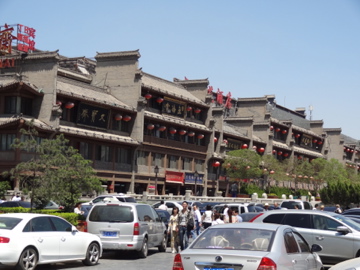 One in five people in the world lives in China and the vast majority is living in the East part of the country. And they can put their money where their mouth is: it's so densely populated. Appropriately enough, each region has its deep culture, which makes the progress on my bicycle much more interesting than ever. I don't have enough time to enjoy everything in this country, but I really need to try not to miss the boat.
One in five people in the world lives in China and the vast majority is living in the East part of the country. And they can put their money where their mouth is: it's so densely populated. Appropriately enough, each region has its deep culture, which makes the progress on my bicycle much more interesting than ever. I don't have enough time to enjoy everything in this country, but I really need to try not to miss the boat.
In contrast to my expectation it was not very easy to get the internet access here. Even if you see that it's not updated for a long while, don't be concerned. I'm probably alive. I don't think that I would ever get a serious problem in this country with these nice Chinese people :)
Gulang-Lanzhou
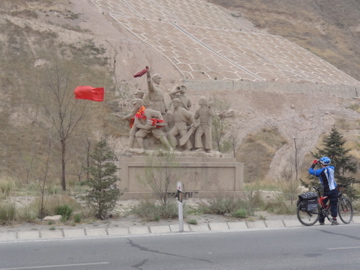 Usually I don't take so much time before I start cycling in the morning. This morning was an exception, since there was Gaorun and I had the opportunity to know what a typical Chinese breakfast looks like. An interesting fact (esp. for Europeans) is that they almost never eat anything sweet in the morning. Sweet things? It will probably make Chinese crazy if you give them something sweet in the morning. The country of strong Kung-fu fighters starts the day with a dish of full meat dumplings with chili sauce.
Usually I don't take so much time before I start cycling in the morning. This morning was an exception, since there was Gaorun and I had the opportunity to know what a typical Chinese breakfast looks like. An interesting fact (esp. for Europeans) is that they almost never eat anything sweet in the morning. Sweet things? It will probably make Chinese crazy if you give them something sweet in the morning. The country of strong Kung-fu fighters starts the day with a dish of full meat dumplings with chili sauce.
Before we started the day, I entirely washed my bicycle, especially the chain which was covered with a thick layer of mud. The noise it was creating before was then cleared out.
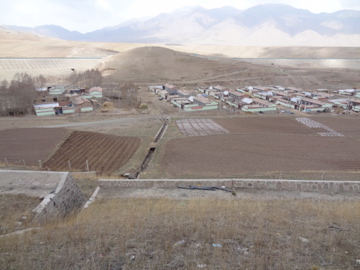 So, the first day of May started like this. What's more, there was a monster waiting for me: 3000m pass. In the city of Gulang it was already at 2000m above sea level so the difference was merely 1000m but you know, it's not so easy to cycle at this height, with full luggage. It took half a day to go up to the top. It also started to rain near the top of the mountain.
So, the first day of May started like this. What's more, there was a monster waiting for me: 3000m pass. In the city of Gulang it was already at 2000m above sea level so the difference was merely 1000m but you know, it's not so easy to cycle at this height, with full luggage. It took half a day to go up to the top. It also started to rain near the top of the mountain.
Interestingly, there were villages before the pass as well. Well, considering that there are people living in Tibet, which lies at 5000m, it's not a big surprise but even in May, it was fairly cold there, though a life like this would interest me as well.
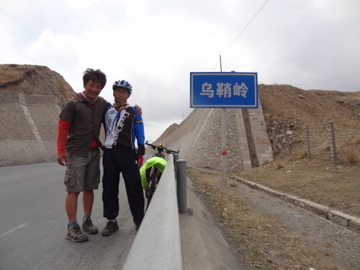 In the end, half past 1, we made it. 3000m. The rest of the day was just to go down the hill. The other side of the pass was even more green and especially, wet. The fact that it appeared to me very cold was assumingly due to lack of movements and the height. It was amazingly only going down. This is a very nice thing in mountains in China (since the side I had to climb up was pretty much the same)
In the end, half past 1, we made it. 3000m. The rest of the day was just to go down the hill. The other side of the pass was even more green and especially, wet. The fact that it appeared to me very cold was assumingly due to lack of movements and the height. It was amazingly only going down. This is a very nice thing in mountains in China (since the side I had to climb up was pretty much the same)
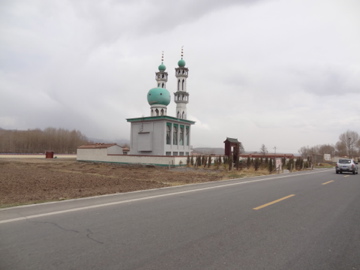 I had seen tons of mosques in Central Asia and Iran and in every country I had the feeling that they look almost the same, however, in different countries they are a little bit different. So the mosques in China look not the same as the ones in Iran. This one has a quite nice Chinese entrance gate. A mixture of Middle East and China.
I had seen tons of mosques in Central Asia and Iran and in every country I had the feeling that they look almost the same, however, in different countries they are a little bit different. So the mosques in China look not the same as the ones in Iran. This one has a quite nice Chinese entrance gate. A mixture of Middle East and China.
In this region, Gansu, there is a substantial number of muslims. According to what I've heard so far, Islam is not particularly welcomed in China, mainly due to the inequality in gender but there're no political ramifications in this problem. Therefore, you can see sometimes women carrying a scarf in the street, which might deviate from your notion of China.
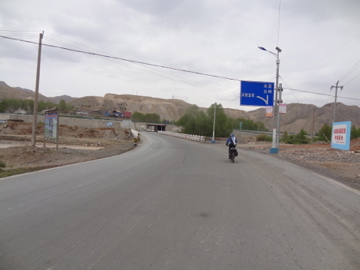 Originally we were planning to stay in a small city for this day which was about 100km away from Lanzhou. However, we arrived there at 4pm. There was just a problem for me that my host of the day, Tracy, lived in the east of Lanzhou, which would make 150km from the place where we were in that moment. So it was impossible to arrive there for me. Gaorun on the other hand, decided to cycle as much as he would be able to and he'd hitch hike to the city in the end. So we decided to start to cycle separately.
Originally we were planning to stay in a small city for this day which was about 100km away from Lanzhou. However, we arrived there at 4pm. There was just a problem for me that my host of the day, Tracy, lived in the east of Lanzhou, which would make 150km from the place where we were in that moment. So it was impossible to arrive there for me. Gaorun on the other hand, decided to cycle as much as he would be able to and he'd hitch hike to the city in the end. So we decided to start to cycle separately.
I hate to travel alone, but there are also things that you can enjoy while cycling alone, like listening to radio programs that you download from the internet and you don't even need to worry about where I stop etc. It's so good that winter is over.
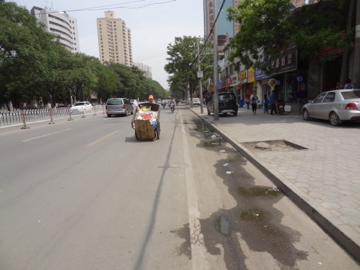 Lanzhou is a city which is confined between two mountains, lying directly at the Yellow River. And therefore, the city is extremely elongated, making it quite strenuous to go from one end to the other.
Lanzhou is a city which is confined between two mountains, lying directly at the Yellow River. And therefore, the city is extremely elongated, making it quite strenuous to go from one end to the other.
The biggest problem of traffic in China is probably not the number of cars going around, but the fact that in this crowded country the people do not really follow the rules. In a relatively safe moment I took a photo when I was going through the city center. Is there any reason that this guy is not walking on the pedestrian zone? And behind him you can already see two scooters coming from the opposite direction. They don't care which direction is supposed to be correct or wrong. They just go their ways. And they will honk if you are on the way...
Perhaps I've already mentioned but according to Lonely Planet, 17 of the 20 most polluted cities in the world are in China. Lanzhou is one of them. This can be particularly felt if you come by bicycle. I could see in the mirror that my eyes were extremely red when I left the city center. I don't know how the people are living in this city...
If you go through Chinese cities, listen to the music some public service cars make. It's mostly either "Happy birthday to you" or "Jingle bell".
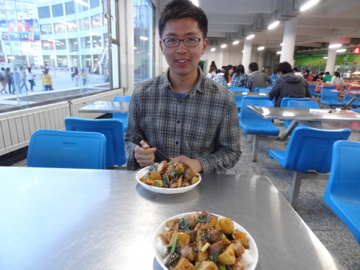 At around 4pm, I arrived in the city part of Tracy. Actually it was the first time for him to host somebody. There are also a lot of Americans from the Peace Corps in Lanzhou and I know that they are quite active in couch surfing so probably he did not need to host anybody before. I was there in the first week of May and all the Peace Corps volunteers were having a week-vacation so there was no one else there. Tracy had a vacation for a week as well but for some reason he was staying in Lanzhou. Peace Corps is a nice thing. I wish there was something similar in Japan...
At around 4pm, I arrived in the city part of Tracy. Actually it was the first time for him to host somebody. There are also a lot of Americans from the Peace Corps in Lanzhou and I know that they are quite active in couch surfing so probably he did not need to host anybody before. I was there in the first week of May and all the Peace Corps volunteers were having a week-vacation so there was no one else there. Tracy had a vacation for a week as well but for some reason he was staying in Lanzhou. Peace Corps is a nice thing. I wish there was something similar in Japan...
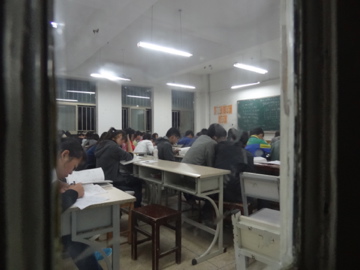 It was actually students' dormitory. Each room had 8 beds and in Tracy's room there were already 7 persons (unbelievable...) so I stayed in a different room in which fortunately there were two other guys. They were all excited to have a foreign guest. Nice guys.
It was actually students' dormitory. Each room had 8 beds and in Tracy's room there were already 7 persons (unbelievable...) so I stayed in a different room in which fortunately there were two other guys. They were all excited to have a foreign guest. Nice guys.
I'm not quite sure about what Tracy said but I think they pay around 500 yuan (80 dollars?) per year for the dormitory. So it's almost like for free. But the toilet cabins for example do not have a door, making it almost like the toilet in Ukraine (cf. surviving in Ukraine)
After the dinner, we visited the campus. The students in the first year must study a lot in China (in contrast to Japan?). It was 9:30pm and these diligent students were studying autonomously. What a wonder.
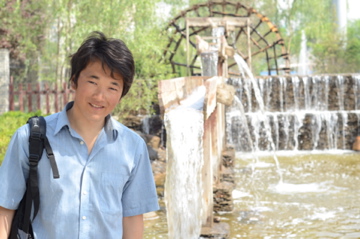 Following day, we visited Lanzhou. We started off with the Yellow River side. It was almost as well equipped as in Lyon, where the river side of Rhône is incredibly beautiful. As in Lyon though, there was pretty much nothing historical there. The only one thing which apparently survived was the water mill you can see on the photo.
Following day, we visited Lanzhou. We started off with the Yellow River side. It was almost as well equipped as in Lyon, where the river side of Rhône is incredibly beautiful. As in Lyon though, there was pretty much nothing historical there. The only one thing which apparently survived was the water mill you can see on the photo.
Even though it was Friday, there were incredibly many people. Aren't they working?
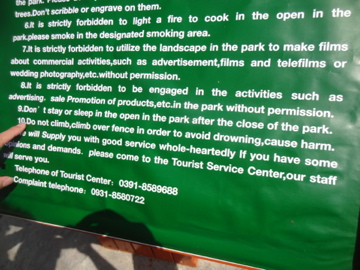 Meanwhile I'm used to the English they speak. Here, for example "Do not climb, climb over fence in order to avoid drowning, cause harm." Well, anyway in each country this kind of non sense warning is existing, though it makes look even funnier when they translate it like this :)
Meanwhile I'm used to the English they speak. Here, for example "Do not climb, climb over fence in order to avoid drowning, cause harm." Well, anyway in each country this kind of non sense warning is existing, though it makes look even funnier when they translate it like this :)
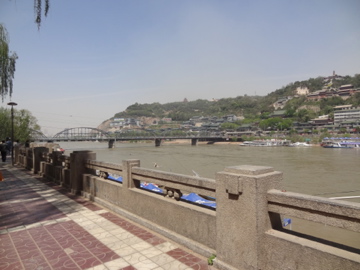 It's a nice thing that there is a river in the city, but you must connect the both sides. In the past, I suppose they used small boats. In the beginning of the 20th century, Germans got the order to construct a big bridge, which still exists and used. Of course it had a practical reason at that time but it is more like a tourist attraction at the same time. Since it is a small bridge it's forbidden for cars to use. Germany was politically not a very good country in the 20th century but they always did a very decent and above all honest job. It's maybe the reason why they could regain the trust of the international community quickly after the war.
It's a nice thing that there is a river in the city, but you must connect the both sides. In the past, I suppose they used small boats. In the beginning of the 20th century, Germans got the order to construct a big bridge, which still exists and used. Of course it had a practical reason at that time but it is more like a tourist attraction at the same time. Since it is a small bridge it's forbidden for cars to use. Germany was politically not a very good country in the 20th century but they always did a very decent and above all honest job. It's maybe the reason why they could regain the trust of the international community quickly after the war.
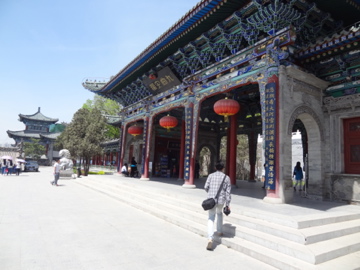 The next object we visited was the white pagoda tower. Well, there's not much to say about this building either since it is not historical either. It is just a construction which looks nice. The pagoda tower itself was the only one which exists for centuries.
The next object we visited was the white pagoda tower. Well, there's not much to say about this building either since it is not historical either. It is just a construction which looks nice. The pagoda tower itself was the only one which exists for centuries.
This tower was on the top of the mountain. As you know, I had to do two passes in the previous days and I had excruciating pain in my legs. Tracy on the other hand plays basket ball a lot and he never seemed to be tired. I think I did a very good job there.
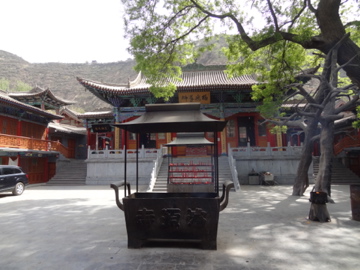 On the other side of the city there was a huge temple. Of course Buddhism comes from India but it's still interesting to see something I'm familiar with in a country I had never visited.
On the other side of the city there was a huge temple. Of course Buddhism comes from India but it's still interesting to see something I'm familiar with in a country I had never visited.
In the evening, we went to a small restaurant near the dormitory. If you pay 10 dollars, you can have a superbe dinner for two persons in China. What a nice country.
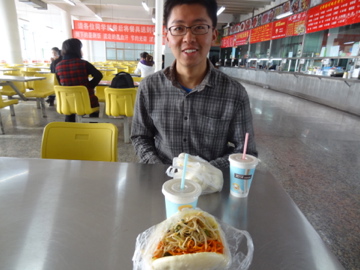 Following day, I was planning to leave Lanzhou, in order not to put Tracy in trouble, since it was a students' dormitory. However, there was some stuff to buy for my bicycle. There was a bicycle shop near the dormitory and we found out that it's very very rare to see a 28-inch bicycles in China. They told me I would have to go to the city center to buy it. Well, I was almost giving up, thinking it's maybe better to try it again in Xi'an. But Tracy told me that there wouldn't be any problem to stay one more day so I decided to look around in the city center. Nice guy.
Following day, I was planning to leave Lanzhou, in order not to put Tracy in trouble, since it was a students' dormitory. However, there was some stuff to buy for my bicycle. There was a bicycle shop near the dormitory and we found out that it's very very rare to see a 28-inch bicycles in China. They told me I would have to go to the city center to buy it. Well, I was almost giving up, thinking it's maybe better to try it again in Xi'an. But Tracy told me that there wouldn't be any problem to stay one more day so I decided to look around in the city center. Nice guy.
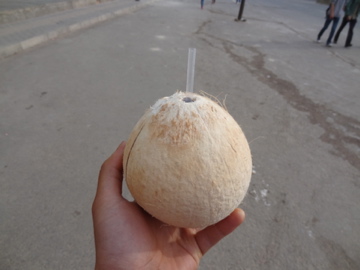 The first coco nut I had in my life. The vendor did not know exactly where it was coming from but probably from the south of China. Pretty nice country that has everything you can imagine. :) At the same time, since summer is coming, the markets are full of vegetables and fruits. Wherever I go I can buy a piece of pineapple or apples for very low prices. It's anyway not hard to stay healthy if you eat Chinese stuff (though some restaurants are pretty dirty so you should be very cautious about hygiene...)
The first coco nut I had in my life. The vendor did not know exactly where it was coming from but probably from the south of China. Pretty nice country that has everything you can imagine. :) At the same time, since summer is coming, the markets are full of vegetables and fruits. Wherever I go I can buy a piece of pineapple or apples for very low prices. It's anyway not hard to stay healthy if you eat Chinese stuff (though some restaurants are pretty dirty so you should be very cautious about hygiene...)
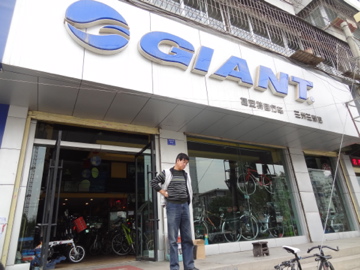 One day more was a great thing. There was one museum which seemed to be quite interesting in the city so we decided to go there together. I don't know exactly why Tracy did not need to go to the university but it's always nice to have a company :)
One day more was a great thing. There was one museum which seemed to be quite interesting in the city so we decided to go there together. I don't know exactly why Tracy did not need to go to the university but it's always nice to have a company :)
We asked around to know where can be found the stuff I needed (which was btw just a couple of tubes). There was one street in Lanzhou which had at least 5 or 6 bicycle shops, whereas most of them didn't have the right size. One of the shops told us even that 28-inch was the standard 30 years ago. I think 30 years ago there was even in Europe no 28 inch...
In the last shop in this street we could find it, just one tube. But at least one and moreover, it's much more important to know that there IS this size in China, which in fact is not a great wonder because the tubes we buy in Europe are usually made in China.
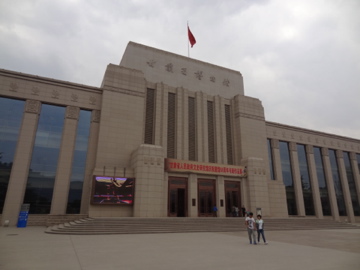 So, the state museum. As in many museums in China, this one was also for free. There are a lot of public services for free in China, if it's for Chinese. If it's for foreigners, it's usually not the case anymore, starting with the Chinese visa (and also the visa card, which cannot be used at all in Lanzhou. Forget about that). At the same time, it is also very difficult for Chinese citizens to get visas for foreign countries so it's maybe about the chicken or the egg.
So, the state museum. As in many museums in China, this one was also for free. There are a lot of public services for free in China, if it's for Chinese. If it's for foreigners, it's usually not the case anymore, starting with the Chinese visa (and also the visa card, which cannot be used at all in Lanzhou. Forget about that). At the same time, it is also very difficult for Chinese citizens to get visas for foreign countries so it's maybe about the chicken or the egg.
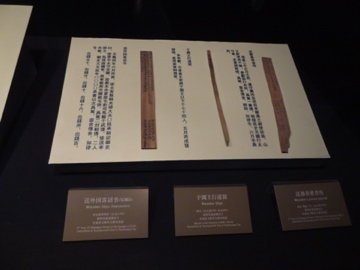 There were a lot of thing related to the Silk Road in this museum. Before I started this trip I was not so much interested in the Silk Road but after having done exactly this route, I know much more about its history and the environment. Now I'm a kind of expert and more interested in this stuff. If ever I write a book about this trip, more than 80% will be about this route I would say, with the development of local cultures.
There were a lot of thing related to the Silk Road in this museum. Before I started this trip I was not so much interested in the Silk Road but after having done exactly this route, I know much more about its history and the environment. Now I'm a kind of expert and more interested in this stuff. If ever I write a book about this trip, more than 80% will be about this route I would say, with the development of local cultures.
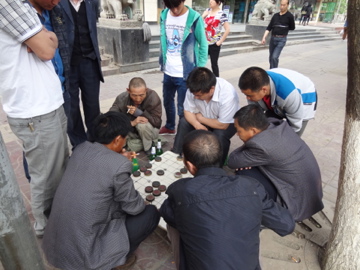 After the museum, we walked around a little bit to see what's going on in the street. People love board games in China, doesn't matter young or old, men or women. I have no idea what they were playing but the audience seems to be interested :)
After the museum, we walked around a little bit to see what's going on in the street. People love board games in China, doesn't matter young or old, men or women. I have no idea what they were playing but the audience seems to be interested :)
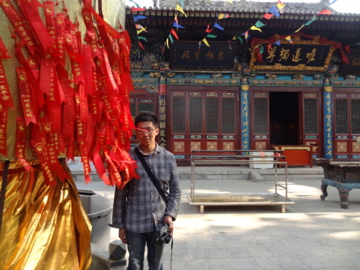 We visited another temple after that, the white cloud temple (?) which also belongs to a kind of Buddhism, though not exactly Buddhism, according to Tracy.
We visited another temple after that, the white cloud temple (?) which also belongs to a kind of Buddhism, though not exactly Buddhism, according to Tracy.
To be true, I was not so interested in the touristic spots in Lanzhou, however, I enjoyed the conversations with Tracy a lot, who comes from a very conservative family. And he's not allowed to have a girl friend until he finishes the university. As he's living alone I cannot believe that it's impossible but the dormitory is separated for boys and girls, so probably it's hard to have an occasion for him. He asked me several times what it is like to have this type of freedom. Without talking about good or bad, my parents never engaged themselves in this sort of issue. Probably they themselves would find it ridiculous to get involved. Not only my parents, I know nobody in my environment who had the same problem as Tracy. The conversation I had with him reminded me of Tehran, where the people do not have freedom at all and of Shadi, asking me what the life in Europe looks like. Again, Eduard and I would wonder, how to make them realize, that it's not about just having a partner that makes sense, but what kind of results it has on his own life. At least I'm very relaxed in my current situation.
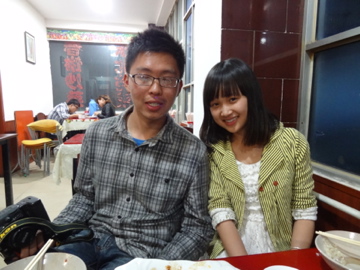 We went to the same restaurant in the evening. There was a girl from his native region, Arina, who joined us there. Her major was English but obviously it was the first time for her to speak English. It was more difficult for her the previous day but there she tried much more. I mean, I'm a (pseudo-) language teacher so she didn't need to be so much worried about saying anything incomprehensible but it's a prevalent problem among Asians (though Chinese girls often talk a lot in comparison with boys)
We went to the same restaurant in the evening. There was a girl from his native region, Arina, who joined us there. Her major was English but obviously it was the first time for her to speak English. It was more difficult for her the previous day but there she tried much more. I mean, I'm a (pseudo-) language teacher so she didn't need to be so much worried about saying anything incomprehensible but it's a prevalent problem among Asians (though Chinese girls often talk a lot in comparison with boys)
The parents of a friend of Tracy was native of Tibet. And he had a traditional hat from there, which he gave me. Too nice!! I was even planning to buy a new hat in Lanzhou but now I've got one which is even a Tibetan style hat. Too cool. I'll use it until I arrive in Japan :)
Lanzhou-Xi'an
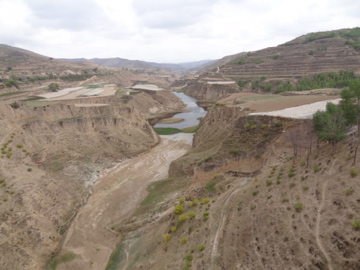 The following day was a little bit cloudy. Tracy assured me that it never rains in this region so I still decided to start cycling.
The following day was a little bit cloudy. Tracy assured me that it never rains in this region so I still decided to start cycling.
The next city is Xi'an, the ancient capital of China, which was the largest city during the Tang dynasty.
The nature was incredibly beautiful there. You can also imagine if you look at the map on google maps. There are only mountains.
The start of the day was very nice, I thought. It was also a very lovely day without a cloud. However, at the end of the day, I found out that I took a very wrong way, though it was also going to Xi'an so I decided to continue to go this way.
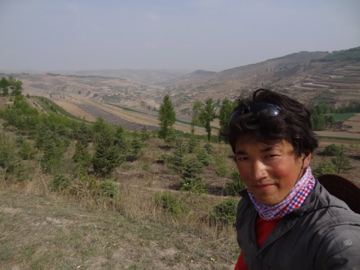 China has several different types of road, as in many countries. There is one called "G312". "G" most probably stands for "Guodao" which means "National Route". This road goes from Xinjiang up to Shanghai, though in Xinjiang is so degraded that it cannot be used properly or it's sometimes simply missing. But in general you can have trust in this road. The one I took was "S207", with "S" standing for "Shengdao" which means "Provincial route". This one, as the name suggests, is not considered to be used for long distance vehicles. Therefore, you can be quite messed up with the road.
China has several different types of road, as in many countries. There is one called "G312". "G" most probably stands for "Guodao" which means "National Route". This road goes from Xinjiang up to Shanghai, though in Xinjiang is so degraded that it cannot be used properly or it's sometimes simply missing. But in general you can have trust in this road. The one I took was "S207", with "S" standing for "Shengdao" which means "Provincial route". This one, as the name suggests, is not considered to be used for long distance vehicles. Therefore, you can be quite messed up with the road.
On the other hand, it was incredibly beautiful. There was maybe one car or two in an hour and mostly I could see local farmers. The up- and downhills were horrible but it made me think of Croatia again, where the landscape was also incredibly beautiful at the Adriatic.
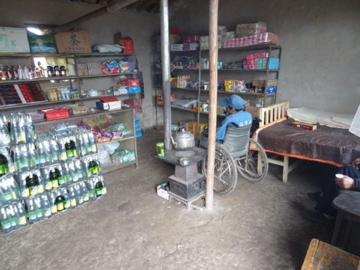 Several times I had to explain that I came from France. They didn't have so much understanding for that. Then I usually said I'm heading for Shanghai. This stirred up the entire community. It had a strong reference to something they knew.
Several times I had to explain that I came from France. They didn't have so much understanding for that. Then I usually said I'm heading for Shanghai. This stirred up the entire community. It had a strong reference to something they knew.
It was almost a wonder that I could still find an ordinary restaurant (?) for lunch, though they had almost no vegetables there. More like a chunk of meat and noodles. They need energy in this region, I think.
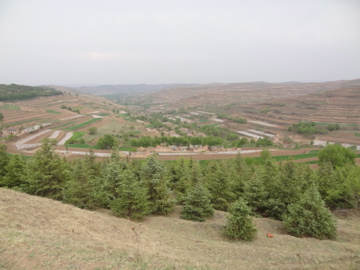 It stayed over 2000m above sea level for the whole day. Fortunately, it was not very difficult to find a place to put a tent. After all, here in this country the people don't really care if there's a tent on the way or not. I just put it near a village and nothing happened. Many people say that China is a not safe country but if you stay far from main cities, it's incredibly safe. It's the country of Confucius. It cannot be too dangerous.
It stayed over 2000m above sea level for the whole day. Fortunately, it was not very difficult to find a place to put a tent. After all, here in this country the people don't really care if there's a tent on the way or not. I just put it near a village and nothing happened. Many people say that China is a not safe country but if you stay far from main cities, it's incredibly safe. It's the country of Confucius. It cannot be too dangerous.
Although I had started at 5am and I cycled until 8pm, I could manage to do only 100km. You can imagine what a mountanous zone I was in.
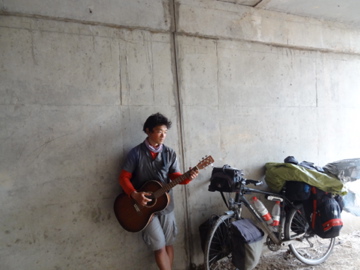 This environment disappeared quite early following day, after I joined G312 again. This route is relatively flat, though it has much more traffic. The idyllic picture of the previous day entirely vanished. What a shame.
This environment disappeared quite early following day, after I joined G312 again. This route is relatively flat, though it has much more traffic. The idyllic picture of the previous day entirely vanished. What a shame.
Just after noon, it started to rain. I don't know when it was the last time to see such an amount of water in the street. I mean, compared with the sense of rain in Europe or Japan, it was merely rain, but it appeared so fresh and new to me meanwhile. I found a tunnel under the high way and stayed there to wait for the end of it. It took merely an hour or so.
In the long winter I survived this year in Central Asia, the nutrition was a main problem. Whenever I had the capacity to eat, I ate, just not to lose fat. However, now I don't need to care about it so much and I eat just three times a day. This caused a lot of problems on this day: I was too weak to cycle, though I didn't know why. I just thought it was coming from the exhaution of the previous day. So I slept at the side of the street, which eventually did not solve the problem. The fact that I'm cycling more than 10 hours a day is just above ordinary circumstances and my body did not realize that the calory intake must be switched to a different mode. Well, I'll take care of that from now on :)
The last time I could take shower was in the dormitory, on the first day, which was almost a week before. In the evening on this day, I put my tent next to a clean small river. The water was very cold but I still could wash myself. How nice that the winter is over. I'm native of Tokyo and still I strongly remember how scared I was to see so many trees in Germany when I was there for the first time, though my family used to go for a summer camp every year, which I hated, for being out of the civilization. How weird that I'm doing it now willingly myself.
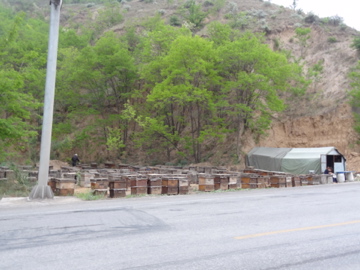 I'm not a kind of person who enjoys the tourist attractions but much more the local tradition in each region. Until there, I always bought a snack for breakfast, which was of course not the Chinese way of living. From this day on, I decided to buy Baozi every morning. It's usually much cheaper and contains a lot more. The problem is just there's no guarantee that you can find a proper shop for that but the desert is over (yahoo!), it cannot be too difficult. At least there in this particular morning, I could find it very quickly.
I'm not a kind of person who enjoys the tourist attractions but much more the local tradition in each region. Until there, I always bought a snack for breakfast, which was of course not the Chinese way of living. From this day on, I decided to buy Baozi every morning. It's usually much cheaper and contains a lot more. The problem is just there's no guarantee that you can find a proper shop for that but the desert is over (yahoo!), it cannot be too difficult. At least there in this particular morning, I could find it very quickly.
The speciality of this region seems to be the honey. You can see a lot of farmers at the street. So many bees flying around. For cyclists it's not very comfortable :)
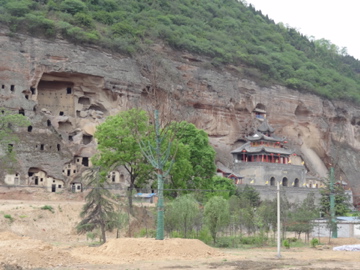 So, the Silk Road is almost over. There are a lot of objects still lying on the way, though I'm not very sure if they exist for a long time.
So, the Silk Road is almost over. There are a lot of objects still lying on the way, though I'm not very sure if they exist for a long time.
I could find only one host for Xi'an, Jesse, who contacted me just two weeks after he signed up on couch surfing (even before I went to Hong Kong. What a long planning) We contacted each other a lot on the way but he cared a lot so I could cycle without thinking of any problems to occur.
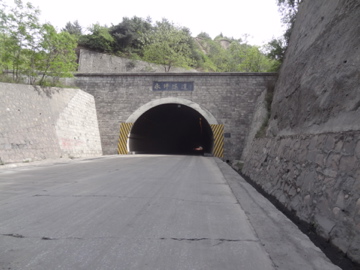 One big problem before the arrival in Xi'an was the tunnels. There were three of them and in each of them there was no ventilation. Besides, the lighting was so weak that I could hardly see anything there. Appropriately enough, it was forbidden for pedestrians and cyclists, what there was no other way either. Fortunately, it was just going down in the first two tunnels, which were for sure more than 3km long. I don't think it's impossible but it will have an immense problem if you get inside from the other side, I suppose. I took this photo in front of the last tunnel and it's not clear here, but the other ones clearly emanating a smog. The last tunnel was anyway relatively short and at least just flat. What a fortune.
One big problem before the arrival in Xi'an was the tunnels. There were three of them and in each of them there was no ventilation. Besides, the lighting was so weak that I could hardly see anything there. Appropriately enough, it was forbidden for pedestrians and cyclists, what there was no other way either. Fortunately, it was just going down in the first two tunnels, which were for sure more than 3km long. I don't think it's impossible but it will have an immense problem if you get inside from the other side, I suppose. I took this photo in front of the last tunnel and it's not clear here, but the other ones clearly emanating a smog. The last tunnel was anyway relatively short and at least just flat. What a fortune.
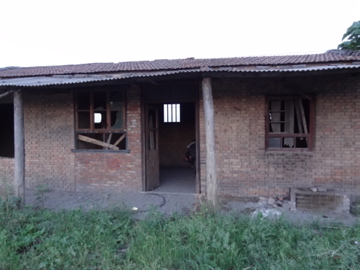 Just the day before my arrival in Xi'an, I stayed in this deserted house, around 70km away from Xi'an. This type of building can be found everywhere in China. In this sense, if you have a tent and a sleeping bag, you will not have too many problems, even though you cannot stay in many hotels in China.
Just the day before my arrival in Xi'an, I stayed in this deserted house, around 70km away from Xi'an. This type of building can be found everywhere in China. In this sense, if you have a tent and a sleeping bag, you will not have too many problems, even though you cannot stay in many hotels in China.
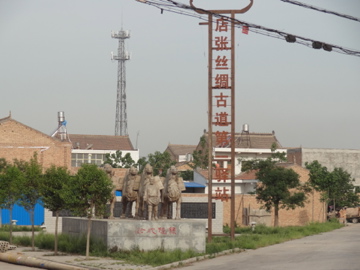 After I had a plate of Baozi, I passed the alleged first stop of the Silk Road. The merchants of that time did around 30km per day, so it would make sense that I saw it there. 30km per day... It would mean that it takes at least one year and a half even if they transported the stuff every day up to Europe, according to what I see on my speed meter.
After I had a plate of Baozi, I passed the alleged first stop of the Silk Road. The merchants of that time did around 30km per day, so it would make sense that I saw it there. 30km per day... It would mean that it takes at least one year and a half even if they transported the stuff every day up to Europe, according to what I see on my speed meter.
When I entered the city of Xi'an, I could feel inconvenience in my eyes. Later I saw that my eyes were completely red. Of course I knew what was the reason but I was still surprised to see the effect. Be prepared if you go to a big city in China.
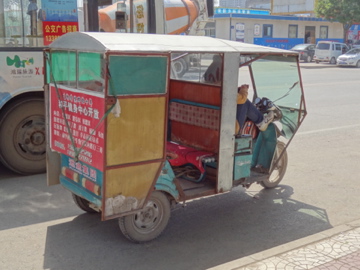 There are around 8 million people in Xi'an, 4 times as large as Lyon, but still there is only one subway line. And Chinese love to use personal cars. The city apparently tried to create a better flow of cars and the main streets have a fast line and side lines. However, as you might have already guessed, these lines are not really functioning. Therefore, it's still hard to go anywhere in Xi'an using bus or taxi. The solution they came up with was apparently this half-scooter taxi. This carriage can contain probably two persons (or can they also get in in four? This kind of possibility is always to explore in China...) If you are on the way in a car, this is probably the most distasteful thing in the street in Xi'an, since they might appear from each corner and go in each direction. Probably they draw the line of regulated and not-regulated by the police.
There are around 8 million people in Xi'an, 4 times as large as Lyon, but still there is only one subway line. And Chinese love to use personal cars. The city apparently tried to create a better flow of cars and the main streets have a fast line and side lines. However, as you might have already guessed, these lines are not really functioning. Therefore, it's still hard to go anywhere in Xi'an using bus or taxi. The solution they came up with was apparently this half-scooter taxi. This carriage can contain probably two persons (or can they also get in in four? This kind of possibility is always to explore in China...) If you are on the way in a car, this is probably the most distasteful thing in the street in Xi'an, since they might appear from each corner and go in each direction. Probably they draw the line of regulated and not-regulated by the police.
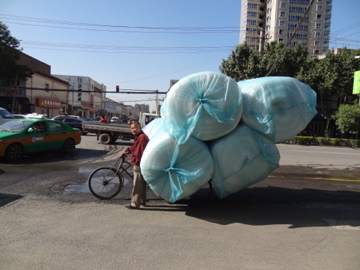 I have a well charged bicycle. I have no idea how many kilograms it weighs. But the dimension is completely different if you come to China. I'm just a beginner...
I have a well charged bicycle. I have no idea how many kilograms it weighs. But the dimension is completely different if you come to China. I'm just a beginner...
It was an incredibly long way to go up to the apartment of Jesse, as you might have imagined. At least Xi'an has very good ring roads, so it's not too difficult to get inside the city. The real interpretation of "not too difficult" is to be pondered upon.
And finally I arrived at Jesse's place! And simultaneously it was the end of the Silk Road, which I happened to follow from the beginning of this trip. Over 14500km up to this point. I respect so much the merchants (or rather the products) that overwent this distance long long time ago.
Jesse got married this January (when I was in Iran). And the newly bought apartment was so clean and above all, so European. As in Japan, young people prefer the European style of living and they are pretty used to it now. His university, Jiaotong university, is one of the best universities in China, though for many Europeans it is hard to understand what this in Asia (like in China, Korea and Japan) means. Well, it doesn't matter, I don't explain it here. I just wanted to say, Asians are often very proud of their universities, if they are very good.
Xi'an
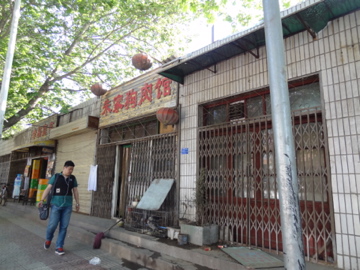 It was Friday and they both had to go to work. After the lunch I walked around the city alone. It was a little bit far away from the city center but from what I saw it was not particularly interesting. It was nice for me to stay at the edge of the city.
It was Friday and they both had to go to work. After the lunch I walked around the city alone. It was a little bit far away from the city center but from what I saw it was not particularly interesting. It was nice for me to stay at the edge of the city.
And here you are, as far as I know, this is a dog meat shop. Later I asked Jesse if he had ever eaten dog meat but actually in the south of the country people do not eat dogs (which his home town belongs to), but it's not just a rumour that people eat dogs in China. Hopefully those who are reading this blog do not find it too disgusting...
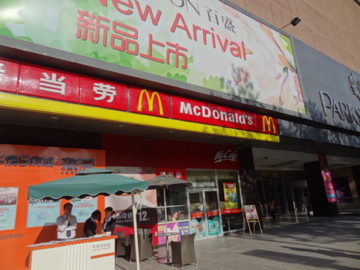 Finally I could find a Mac Donalds in China. In Urumqi and Lanzhou, where there is a substantial number of muslims are living, they cannot make it since the foods contain pork. Jesse told me though, it's not as popular as KFC in Xi'an, which seems to be the general opinion regarding the amazing number of KFC everywhere in China. I see no reason to favor KFC or Mac Donalds over Chinese foods here.
Finally I could find a Mac Donalds in China. In Urumqi and Lanzhou, where there is a substantial number of muslims are living, they cannot make it since the foods contain pork. Jesse told me though, it's not as popular as KFC in Xi'an, which seems to be the general opinion regarding the amazing number of KFC everywhere in China. I see no reason to favor KFC or Mac Donalds over Chinese foods here.
On the way back home, I had again Banmian (Jesse and his wife, Jane had dinner at the institute they are working in). I think I should gradually start to take something more Chinese than that...
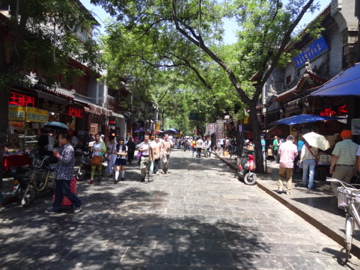 Following day, I went jogging, for the first time since the beginning of this trip. I could have done it in Tehran but I was too afraid of the air pollution. The same situation applies for China. I think next time I would do it will be in Korea or Japan.
Following day, I went jogging, for the first time since the beginning of this trip. I could have done it in Tehran but I was too afraid of the air pollution. The same situation applies for China. I think next time I would do it will be in Korea or Japan.
Jesse wanted to come with me for jogging, telling me I would not need to wake him up since if I'd walk around, he would anyway wake up. He didn't. To be more precise, he woke up at 11am (I did at 6am...) I think he worked very hard this week :)
So, it was Saturday. We decided to go to the city center together for brunch (at 1pm...) Usually, Chinese get up really early in the morning, like at 5am or so. Jesse and Jane may enjoy the weekend perhaps a little bit more than other people :)
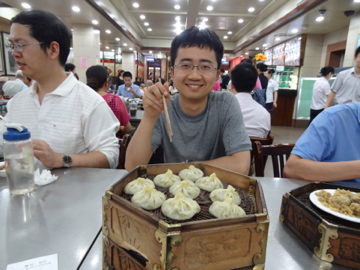 The city center was so over crowded, resembling none of the cities I have seen so far. It's the Chinese quality that you cannot encounter in other countries :)
The city center was so over crowded, resembling none of the cities I have seen so far. It's the Chinese quality that you cannot encounter in other countries :)
This brunch was of course some kind of Baozi again, with oily spicy sauce. It's a wonder that I was having croissants with jam merely a year ago.
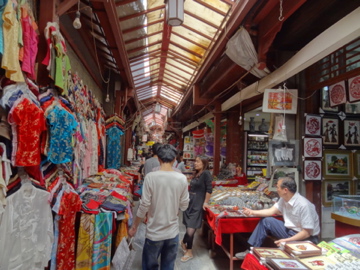 Then we walked around the city. Xi'an is known to be a very historical city but actually the historical one was called Chang'an, which is not exactly the same city as Xi'an. In any case, I was not particularly interested in the gaudy fortification of the city, but more in the internal life. And I have to say, there are obviously many many tourists who think the same way as I, since the stuff you can find there is solely for tourists. Partially you can find English descriptions but no Chinese ones (but I could not see so many foreigners in Xi'an in total. Hm...)
Then we walked around the city. Xi'an is known to be a very historical city but actually the historical one was called Chang'an, which is not exactly the same city as Xi'an. In any case, I was not particularly interested in the gaudy fortification of the city, but more in the internal life. And I have to say, there are obviously many many tourists who think the same way as I, since the stuff you can find there is solely for tourists. Partially you can find English descriptions but no Chinese ones (but I could not see so many foreigners in Xi'an in total. Hm...)
It was an incredibly warm day. We walked around the whole day and were completely exhausted. I suppose Jesse was even more exhausted than I since he had to drive to the city center, which I would personally never do in Xi'an...
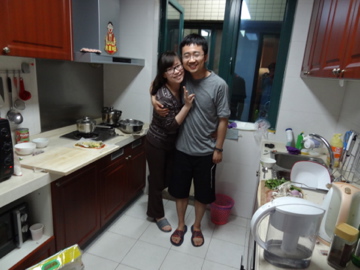 Whenever I stay at someone's place, I try to express gratitude in some way. I'm not using couch surfing for money in the end. This time, what did I do? We made pizza! This was a very nice technique which Julien (a friend and later my flat mate) and I developed together. I could not do it in Urumqi and Lanzhou since there was no oven. You can not find many households with an oven in China, which totally makes sense. Jesse and Jane have a very Western style so I could find pretty much everything I needed. The taste of the pizza was a little bit Chinese :)
Whenever I stay at someone's place, I try to express gratitude in some way. I'm not using couch surfing for money in the end. This time, what did I do? We made pizza! This was a very nice technique which Julien (a friend and later my flat mate) and I developed together. I could not do it in Urumqi and Lanzhou since there was no oven. You can not find many households with an oven in China, which totally makes sense. Jesse and Jane have a very Western style so I could find pretty much everything I needed. The taste of the pizza was a little bit Chinese :)
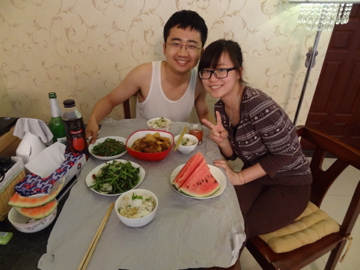 After their marriage in January, Jane started to cook herself. Maybe it is something everyone must be able to do in China, but she cooked so well following noon. In this couple, the wife cooks and the husband washes the dishes, making the husband totally dependent on the wife.
After their marriage in January, Jane started to cook herself. Maybe it is something everyone must be able to do in China, but she cooked so well following noon. In this couple, the wife cooks and the husband washes the dishes, making the husband totally dependent on the wife.
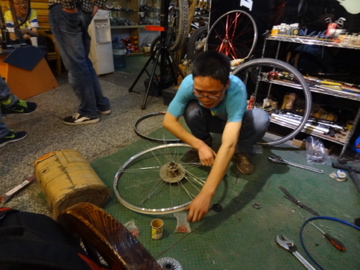 So, there was actually a big problem with my bicycle, which I was all the time aware of, namely, the wheel was broken. More precisely, two of the foundations of two of the bones had been destroyed. They were quite far away from each other so I was almost sure that the bicycle would not collapse within a few kilometers, but there is still more than 1500km to go in China. At the same time, I was still worried about the fact that 28-inch is not very popular in China. Anyway, I walked around to ask if there is a bicycle shop which might sell a wheel for my bicycle, almost desperately.
So, there was actually a big problem with my bicycle, which I was all the time aware of, namely, the wheel was broken. More precisely, two of the foundations of two of the bones had been destroyed. They were quite far away from each other so I was almost sure that the bicycle would not collapse within a few kilometers, but there is still more than 1500km to go in China. At the same time, I was still worried about the fact that 28-inch is not very popular in China. Anyway, I walked around to ask if there is a bicycle shop which might sell a wheel for my bicycle, almost desperately.
There is one street in Xi'an, Santalu, where there are at least 20 bicycle shops. One of which had exactly the wheel I needed! The staff were also very friendly to me and more than willing to help me to clean my bicycle etc.
In the end, my bicycle could be successfully repaired. It took 15 euros, whereas I had calculated with 80 euros before I arrived in Xi'an. Too nice :)
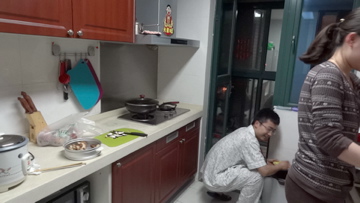 I had told the lovely couple that it is my turn to cook but in the end, I came back home too late and Jane had already started to cook. It was Lamian this time. In principle it has the same origin as "Ramen" which is quite famous in Japan but it is a completely different thing in China. I took a video while Jane was making it but since the speed of the internet connection is limited in China, it will be probably when I'm in Korea or Japan that you will be able to watch the video. It is anyway impressive that she made the noodles herself from flour. Maybe I can try it too when I go back to France :)
I had told the lovely couple that it is my turn to cook but in the end, I came back home too late and Jane had already started to cook. It was Lamian this time. In principle it has the same origin as "Ramen" which is quite famous in Japan but it is a completely different thing in China. I took a video while Jane was making it but since the speed of the internet connection is limited in China, it will be probably when I'm in Korea or Japan that you will be able to watch the video. It is anyway impressive that she made the noodles herself from flour. Maybe I can try it too when I go back to France :)
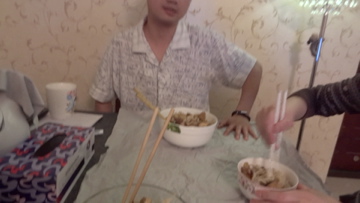 Jane had a business trip to wuhan on the next day and as I wanted to cook again before she goes away, I stayed at home, updating my website. A cool thing in China is whenever I cook something European, it's somewhat stylish, even if the taste was less than that. Or maybe it's just the personalities of Jasse and Jane which did not tell me anything negative. In any case, it was a moderate success and I did not lose face :)
Jane had a business trip to wuhan on the next day and as I wanted to cook again before she goes away, I stayed at home, updating my website. A cool thing in China is whenever I cook something European, it's somewhat stylish, even if the taste was less than that. Or maybe it's just the personalities of Jasse and Jane which did not tell me anything negative. In any case, it was a moderate success and I did not lose face :)
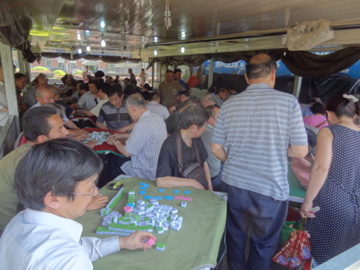 The sunshine outside was formidable but still I walked around in the afternoon. It's not so nice to be home alone exploiting couch surfing. While Jesse was having a nap I snuck out of the apartment and walked around the city.
The sunshine outside was formidable but still I walked around in the afternoon. It's not so nice to be home alone exploiting couch surfing. While Jesse was having a nap I snuck out of the apartment and walked around the city.
The fortification around Xi'an is extraordinary, but still I cannot get along with the fact that the traditional style objects are not quite historical stuff. But I still found it funny to see so many people playing cards or Mahjongg. If you walk around in China, you'll get the impression that there are so many people who do not work at all. I don't know how the economy is still so booming there :)
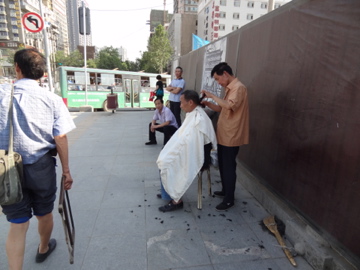 Jesse could have had dinner at his institute but he came back home to have dinner with me. I had no idea what to cook but I just bought plenty of vegetables outside. We cooked everything together and it was already a dinner, with some kind of Chinese soy sauce which makes everything somewhat tasty. I mean, this is something I do fairly often so I knew that it would work but obviously Jesse was impressed to see that such a mishmash can become something edible, which also makes sense since in Chinese dormitories there is no way to cook at all and he got married just after he graduated from the university.
Jesse could have had dinner at his institute but he came back home to have dinner with me. I had no idea what to cook but I just bought plenty of vegetables outside. We cooked everything together and it was already a dinner, with some kind of Chinese soy sauce which makes everything somewhat tasty. I mean, this is something I do fairly often so I knew that it would work but obviously Jesse was impressed to see that such a mishmash can become something edible, which also makes sense since in Chinese dormitories there is no way to cook at all and he got married just after he graduated from the university.
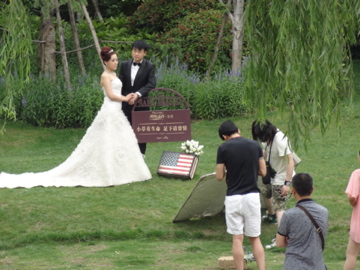 I wanted to leave the following day but there were still so many things to do there. Jesse nicely told me that I could stay one more day. He was a very nice guy...
I wanted to leave the following day but there were still so many things to do there. Jesse nicely told me that I could stay one more day. He was a very nice guy...
However, it had been several days since the last rain and from his room in the high building at the edge of Xi'an I could not clearly see many objects, as is one of the main problems in many Chinese cities. I did not want to go to the city center so I decided to cycle around the city.
It was still a sunny day and there were many newly married couples in the park, making very nice kitschy photos. I like that in Asian countries. It's a pity that it doesn't exist in Japan.
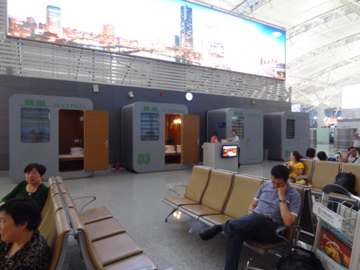 I happened to arrive at the airport of Xi'an in the end. The sleep boxes were like capsule hotels in Tokyo, though these ones looked much more comfortable. In the post office there, I sent 10 postcards. The guy at the reception spoke English German and French (and a little bit Japanese). These are probably the nationalities that are seen the most often in Xi'an. Maybe I can work there later in my life (if I speak Chinese, which is almost desperate now :)
I happened to arrive at the airport of Xi'an in the end. The sleep boxes were like capsule hotels in Tokyo, though these ones looked much more comfortable. In the post office there, I sent 10 postcards. The guy at the reception spoke English German and French (and a little bit Japanese). These are probably the nationalities that are seen the most often in Xi'an. Maybe I can work there later in my life (if I speak Chinese, which is almost desperate now :)
So was the last day in Xi'an. In the end, I didn't even see the terracotta warriers at all. If I had been born 500 years ago I would have been interested but now I can see them in the internet and there was no reason for me to go there additionally. It's the tourism of the 21st century. I think everyone should rethink what he or she is actually interested in. It makes me every time crazy to see tourists coming by bus and without looking at the objects they just take photos and go away. Sure, it will make an evidence that you have been there and it was precious 50 years ago. Now, there is an entirely different situation.
However, exactly for this reason it was extremely interesting to stay at Jesse's place. Indeed, he graduated from one of the best universities in China. But if you know the situation in Asia, you know that it doesn't mean anything. There is so much nonsense going on. You can never estimate the person according to his or her university. In the case of Jesse, however, I must openly admit that he was one of the most intellectual people I have ever met, in the sense that he had a clear vision of what the world should look like to come together without having distortions. His wife, Jane appeared also quite intellectual but I could not find it out directly since we did not talk about heavy stuff. Anyway, while I still stayed at his apartment, I was sure that I would later miss the conversations I had with him, which also turned out to be painfully true. He is not going to have much time as he has already started to work as ordinary employee but I promised him to take care of his child(-ren) sereral years from now. Probably he took it as a joke but I'm already looking forward to it :)
Xi'an-Wuhan
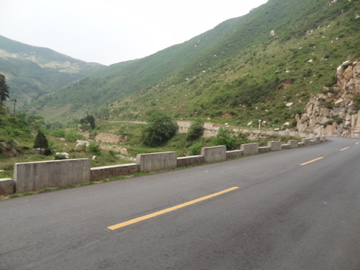 The distance between Xi'an and Wuhan is around 800km. The distance itself is not a big problem but there are not so many big cities. I could find couch hosts only in Wuhan so I decided to go there directly without stop, which turned out to be a little bit more difficult than I thought, mainly because of the geography of that region. One cool thing was that there was clearly less traffic just after Xi'an. Well, you can maybe imagine that there were some mountains waiting for me.
The distance between Xi'an and Wuhan is around 800km. The distance itself is not a big problem but there are not so many big cities. I could find couch hosts only in Wuhan so I decided to go there directly without stop, which turned out to be a little bit more difficult than I thought, mainly because of the geography of that region. One cool thing was that there was clearly less traffic just after Xi'an. Well, you can maybe imagine that there were some mountains waiting for me.
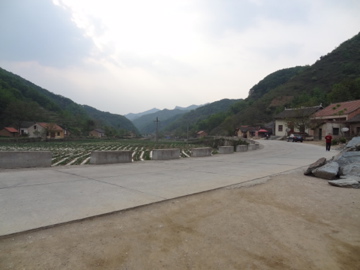 Even though there was no big city, there were plenty of villages on the way. I can probably even say that there was almost no place where there was no house.
Even though there was no big city, there were plenty of villages on the way. I can probably even say that there was almost no place where there was no house.
On the top of the mountain, I had dinner. The owner of the restaurant, who was an old woman, told me that I looked like his son who is not living with her anymore. Maybe this was the reason why she wanted to bring as much food as I could become more than full. Fortunately, it was the top of the mountain.
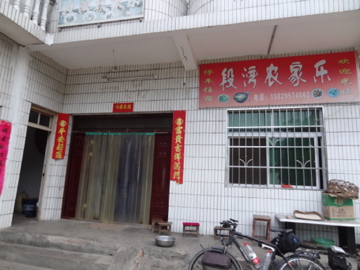 One cool thing that happened the following day was that in the restaurant where I had dinner, the owner was so impressed after I told him that I'm cycling from France, that he wanted to host me there. It was a hotel. Second time that I couch surfed in a hotel. After having cycled two days in mountains, I really needed a shower. How nice that they hosted me there.
One cool thing that happened the following day was that in the restaurant where I had dinner, the owner was so impressed after I told him that I'm cycling from France, that he wanted to host me there. It was a hotel. Second time that I couch surfed in a hotel. After having cycled two days in mountains, I really needed a shower. How nice that they hosted me there.
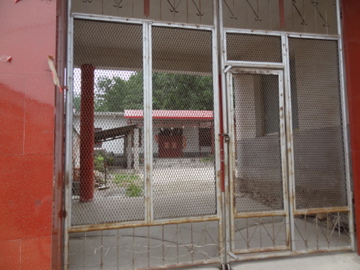 Luckily, the mountanous region was over after the first two days. The roads were running at rivers and there were just small knolls.
Luckily, the mountanous region was over after the first two days. The roads were running at rivers and there were just small knolls.
There were many interesting objects on the way. I definitely should create a slide show (which I will do when I arrive in Japan). The house behind the wire netting is a Christian church. Unfortunately there was nobody around and the door was closed, so I could not see what it would look like inside but clearly the construction is different from what we know in Europe as church.
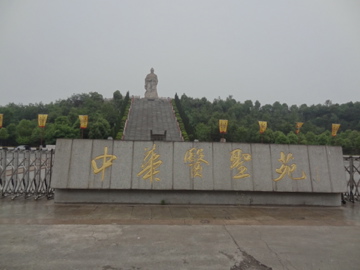 It was a rainy day. I personally don't have a problem but my bicycle does not like it at all. It does not get a glitch but it's malfunctioning after a rain. Well, after Wuhan I will probably have enough couch hosts so I'll be able to avoid rain I think.
It was a rainy day. I personally don't have a problem but my bicycle does not like it at all. It does not get a glitch but it's malfunctioning after a rain. Well, after Wuhan I will probably have enough couch hosts so I'll be able to avoid rain I think.
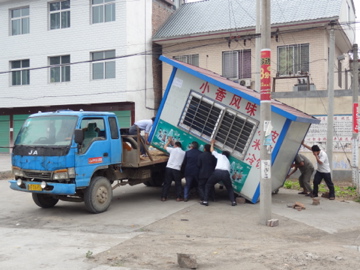 If you ask a German whether Germans speak English well or not, he or she will probably reply "I do, but others maybe not." Actually everyone speaks very good English. And my favorite podcast "stuff you should know" (which I'm listening to all the time while I'm cycling) told me that if you ask someone if he or she would be bothered to see a guy crying, this person will reply "I personally ain't, but probably others are". The same thing applies to Chinese citizens. If you ask them whether they like Japanese or not, every one of them will say "I do, but others probably not". In the end, everyone likes Japan. I don't know whether the protest actions we saw in the TV are truely an important issue.
If you ask a German whether Germans speak English well or not, he or she will probably reply "I do, but others maybe not." Actually everyone speaks very good English. And my favorite podcast "stuff you should know" (which I'm listening to all the time while I'm cycling) told me that if you ask someone if he or she would be bothered to see a guy crying, this person will reply "I personally ain't, but probably others are". The same thing applies to Chinese citizens. If you ask them whether they like Japanese or not, every one of them will say "I do, but others probably not". In the end, everyone likes Japan. I don't know whether the protest actions we saw in the TV are truely an important issue.
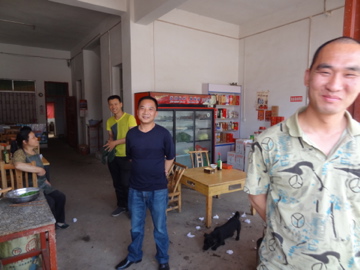 It's again much more important for most of the people that I'm cycling from France. In the restaurant where I had lunch following day, the guys on the photos were simply so impressed that they did not want to take money from me. It was also only slightly more than one euro but it's still nice to feel this kind of friendliness there.
It's again much more important for most of the people that I'm cycling from France. In the restaurant where I had lunch following day, the guys on the photos were simply so impressed that they did not want to take money from me. It was also only slightly more than one euro but it's still nice to feel this kind of friendliness there.
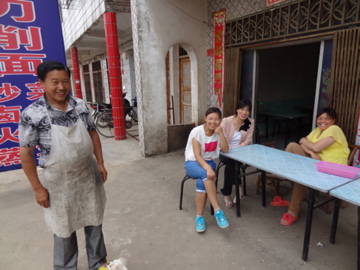 I have for sure already mentioned that I have bought new tires in Hong Kong, which came from Taiwan. Until that point I had German tires and had three or four flat tires. There was almost no reason to change them but I just thought it was too long (I had bought them in Turkey, which means I had done around 9000km with them) and 28 inch is very hard to find in the mainland China. However, since then, I have about one flat tire per day. The moral of the story is that the quality of Schwalbe should not be neglected,
I have for sure already mentioned that I have bought new tires in Hong Kong, which came from Taiwan. Until that point I had German tires and had three or four flat tires. There was almost no reason to change them but I just thought it was too long (I had bought them in Turkey, which means I had done around 9000km with them) and 28 inch is very hard to find in the mainland China. However, since then, I have about one flat tire per day. The moral of the story is that the quality of Schwalbe should not be neglected,
Well, on the other hand, the day is now simply too long and it's impossible to cycle the whole day. It is also nice to stop and do something else. Here, on the next day at the lunch, I had to stop at a restaurant and while I was repairing the bicycle, I talked with the waiters. In the end, the same effect appeared again: they did not want to take money from me. The Chinese language is one of the most difficult ones in the world but still I would recommend it to the travelers. It makes your situation drastically different.
It's rather a side note but I suffered from eczema on the way. Apparently it was coming from the fruits I bought on the street. I did not bite into them directly but you must stay wary of possible reactions like this if you buy fresh things.
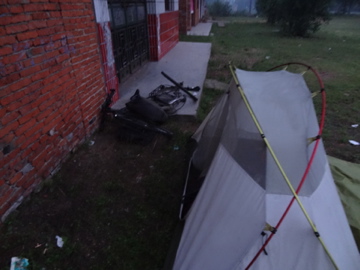 Two days before I arrived in Wuhan, I put my tent in front of a house. The people in the house wanted to offer whatever they had, like water, dinner etc. I just needed a place to stay but thank you :)
Two days before I arrived in Wuhan, I put my tent in front of a house. The people in the house wanted to offer whatever they had, like water, dinner etc. I just needed a place to stay but thank you :)
It's a wonder that I was suffering from the cold just a month ago since now I cannot sleep in anymore because of the heat. This part of China, especially Chongqing, Wuhan and Nanjing are called furnaces of China. It's still not the warmest month. I have to get used to it now...
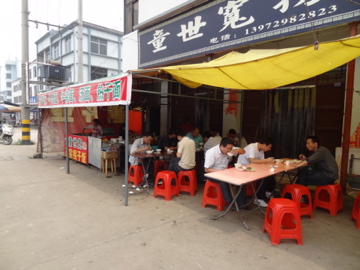 The cuisine in China varies a lot, according to regions. The banmian I used to take all the time in Xinjiang does not appear anymore. However, in this region you can find all you can eat restaurants just like this one. It cost about 1 euro 50 and I could take so much stuff that I needed to eat almost nothing for the rest of the day. I think a cyclist is a horrible visitor for them and I could clearly see the surprise in their faces while I was swinging around in front of the buffet.
The cuisine in China varies a lot, according to regions. The banmian I used to take all the time in Xinjiang does not appear anymore. However, in this region you can find all you can eat restaurants just like this one. It cost about 1 euro 50 and I could take so much stuff that I needed to eat almost nothing for the rest of the day. I think a cyclist is a horrible visitor for them and I could clearly see the surprise in their faces while I was swinging around in front of the buffet.
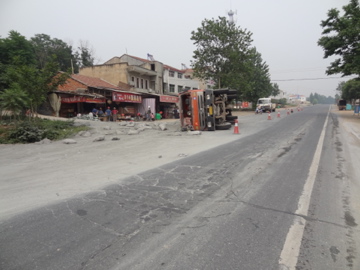 In Europe, we say that the traffic in Paris is terrible. I would personally never drive a car in Paris either. Many people in Japan say the same thing about Tokyo. But these people certainly have never seen the traffic in (continental) Asia: starting from Istanbul (which is not really a part of Asia), every big city like Ankara, Tehran or Tashkent was way worse than that. However, there is a certain kind of "order" in these cities, too, which I could not directly see but at the minimum the people do not die. China is different in this sense. I could see numerous accidents on the way, some of which even fatal, which I had never seen in my life before. "I have the priority" cannot be just said as it should be here. I think I'm gonna stay more careful than ever :)
In Europe, we say that the traffic in Paris is terrible. I would personally never drive a car in Paris either. Many people in Japan say the same thing about Tokyo. But these people certainly have never seen the traffic in (continental) Asia: starting from Istanbul (which is not really a part of Asia), every big city like Ankara, Tehran or Tashkent was way worse than that. However, there is a certain kind of "order" in these cities, too, which I could not directly see but at the minimum the people do not die. China is different in this sense. I could see numerous accidents on the way, some of which even fatal, which I had never seen in my life before. "I have the priority" cannot be just said as it should be here. I think I'm gonna stay more careful than ever :)
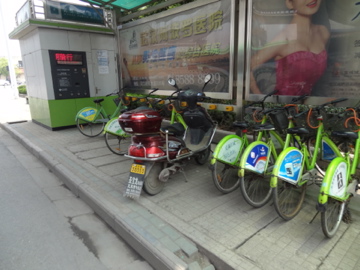 After seven days of lazy cycling I arrived in Wuhan. Wuhan is said to be the biggest city in China, consisting of formerly three different cities, divided by rivers, one of which is the Yangtze river, the longest river in China.
After seven days of lazy cycling I arrived in Wuhan. Wuhan is said to be the biggest city in China, consisting of formerly three different cities, divided by rivers, one of which is the Yangtze river, the longest river in China.
French cities are now trying to introduce rent bikes in the cities. For example in Lyon, there are a lot of bike stations and you can rent a bike for a very low price. Especially you can give it back at any bike station so many people now use a bicycle to go from one point to the other. This city, Wuhan, has apparently introduced the same concept. And this city has also two metro lines. If they continue to create other lines, maybe the traffic jam is not a big problem anymore in Wuhan. At the moment, it seems like just a dream :)
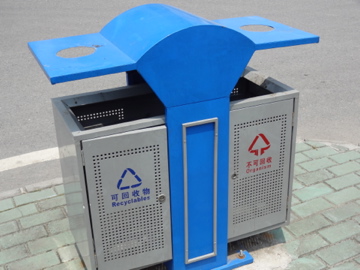 The ecology is not a big issue in China. I talked about it in Xi'an with Jesse. He told me that the trash boxes in the city have usually two bins, "recyclables" and "non-recyclables". At the moment though, the people throw away things into a random bin, simply because they don't know what can be recycled and what cannot be. Here in Wuhan, it's not about "recyclables" and "non-recyclables", but it's about "recyclables" and "organism"... Maybe I can find plenty of amoebae there :)
The ecology is not a big issue in China. I talked about it in Xi'an with Jesse. He told me that the trash boxes in the city have usually two bins, "recyclables" and "non-recyclables". At the moment though, the people throw away things into a random bin, simply because they don't know what can be recycled and what cannot be. Here in Wuhan, it's not about "recyclables" and "non-recyclables", but it's about "recyclables" and "organism"... Maybe I can find plenty of amoebae there :)
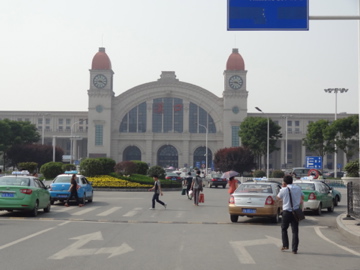 My host, Wei, was to come back home at 6pm. Since the rendezvous point, Hankou railway station was at the north western edge of the city, I didn't dare to go into the city center. It's always better to stay away from Chinese city centers :)
My host, Wei, was to come back home at 6pm. Since the rendezvous point, Hankou railway station was at the north western edge of the city, I didn't dare to go into the city center. It's always better to stay away from Chinese city centers :)
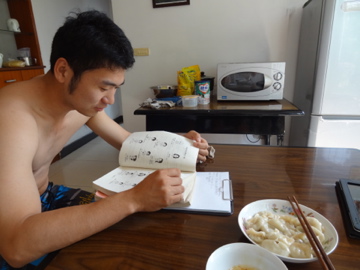 While waiting for him, I tried to study Chinese, but the people speak Chinese with strong accent in this region. I could understand young people more or less but it was almost hopeless with elderly people. I could not even understand some numbers, which are usually not so difficult to understand in Chinese.
While waiting for him, I tried to study Chinese, but the people speak Chinese with strong accent in this region. I could understand young people more or less but it was almost hopeless with elderly people. I could not even understand some numbers, which are usually not so difficult to understand in Chinese.
Wei was living in an apartment with his parents. They did not speak English at all and Wei himself was also a beginner, regardless of which they were very nice and friendly to me. There was another Japanese couch surfer a year before and he left Wei a text book in Japanese. It's called "Minna no nihongo", the one which is widely used all over the world. Well, probably it's hard for him to know all the Katakana and Hiragana but he was trying to read it at the breakfast table.
Wei also likes traveling. He traveled around China and South East Asia and now he is trying to go to Japan. It's a pity that I'm not living in Japan at the moment.
Wuhan
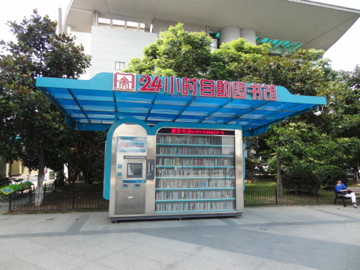 I cycled very slowly in the last 7 days but still I could feel certain degree of exhaution. We stayed at home until later in the afternoon (it was also incredibly hot there).
I cycled very slowly in the last 7 days but still I could feel certain degree of exhaution. We stayed at home until later in the afternoon (it was also incredibly hot there).
Wei had to go to work so I contacted another couch surfer, Wendy.
The object on the photo is an ATM library. You can find it everywhere in the city and borrow a book.
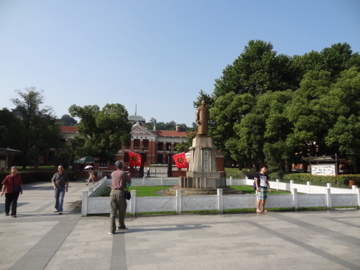 If you are intersted in history, you certainly know the Wuchang uprising of 1911, which invoked the Xinhai revolution, marking the end of the Qing dynasty and the start of the modern China, though this structure was again dissolved in 1949. I always knew that it started in Wuchang, but did not know where Wuchang was. It was actually just a part of Wuhan and there was a memorial in the south east of the city. It was a little bit funny to bump into a historical place that I had known for such a long time, though without knowing that I happened to be there.
If you are intersted in history, you certainly know the Wuchang uprising of 1911, which invoked the Xinhai revolution, marking the end of the Qing dynasty and the start of the modern China, though this structure was again dissolved in 1949. I always knew that it started in Wuchang, but did not know where Wuchang was. It was actually just a part of Wuhan and there was a memorial in the south east of the city. It was a little bit funny to bump into a historical place that I had known for such a long time, though without knowing that I happened to be there.
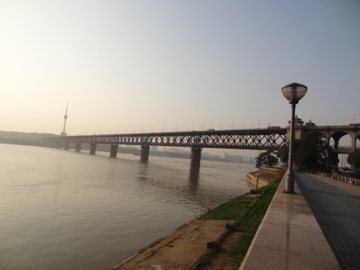 The Yangtze river is very wide. Originally there were only boats connecting the two sides but in the early 20th century (or maybe it was in the 19th century) Russia constructed a bridge over this river, which is actually the one on the photo. From nearby, you can see that it looks so rigid and robust, much more than the one in Lanzhou (though in Lanzhou the river was much smaller). Now, the bridge is still in use but as it is overused, they are constructing other bridges.
The Yangtze river is very wide. Originally there were only boats connecting the two sides but in the early 20th century (or maybe it was in the 19th century) Russia constructed a bridge over this river, which is actually the one on the photo. From nearby, you can see that it looks so rigid and robust, much more than the one in Lanzhou (though in Lanzhou the river was much smaller). Now, the bridge is still in use but as it is overused, they are constructing other bridges.
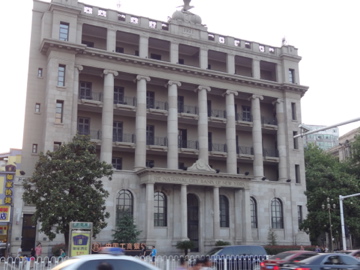 The river side of Yangtze was occupied by Western buildings, used around a century ago. They are still used for different institutions.
The river side of Yangtze was occupied by Western buildings, used around a century ago. They are still used for different institutions.
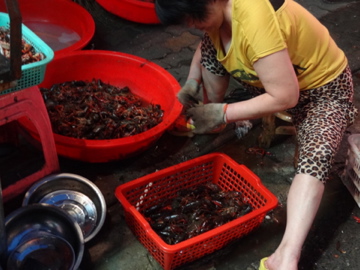 Wendy spoke quite good English. I also tried to speak a little bit Chinese but again, because of my pronunciation she did not understand what I was saying. I don't know if I can ever overcome this hurdle. If ever Chinese had not had this problem, it would have the possibility to become an international language but unfortunately for them, English is way easier and handier for most of the nationalities.
Wendy spoke quite good English. I also tried to speak a little bit Chinese but again, because of my pronunciation she did not understand what I was saying. I don't know if I can ever overcome this hurdle. If ever Chinese had not had this problem, it would have the possibility to become an international language but unfortunately for them, English is way easier and handier for most of the nationalities.
As everywhere in Asia, there were several markets in Wuhan and we decided to have dinner there. From the point of view of hygiene, it is impossible to have such a market in Europe and Japan (there was such a thing before in Japan and each stand was called "yatai" but they do not exist anymore).
People in Wuhan eat lobsters like those on the photo. I used to fish them in a small lake near my house when I was little but I had never imagined to eat them. Hmmm...
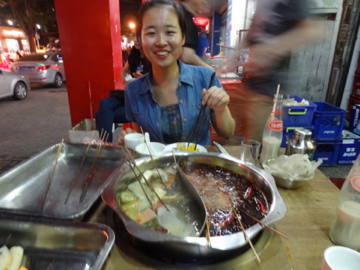 The dinner was Huoguo (=fire pot). A very famous traditional Chinese stuff. Wendy is native to Shandong province, which is in the north of China, but she told me the Huoguo in Wuhan is better than there. The "fire" part probably does not come from the heating system under the pot, but I suppose it's coming from the spice used in the pot. It was incredibly spicy and hot. It was also a quite warm day and after this meal I was completely wet in sweat. She then told me that it is usually eaten in winter. Well, maybe she should have said it before we chose Huoguo for the dinner :)
The dinner was Huoguo (=fire pot). A very famous traditional Chinese stuff. Wendy is native to Shandong province, which is in the north of China, but she told me the Huoguo in Wuhan is better than there. The "fire" part probably does not come from the heating system under the pot, but I suppose it's coming from the spice used in the pot. It was incredibly spicy and hot. It was also a quite warm day and after this meal I was completely wet in sweat. She then told me that it is usually eaten in winter. Well, maybe she should have said it before we chose Huoguo for the dinner :)
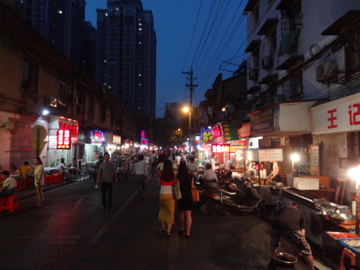 What is the greatest advantage of couch surfing? There are many arguments but one of them is that you can see many hidden local things in the city. As a tourist, I would probably walk around in this street on the photo and never think of going into one of the buildings without reasons. However, the most interesting part of the streets like this one is in the buildings, since actually you can go to the roof. Of course you must know which building is accessible and which is not. Anyway, Wendy helped me out there.
What is the greatest advantage of couch surfing? There are many arguments but one of them is that you can see many hidden local things in the city. As a tourist, I would probably walk around in this street on the photo and never think of going into one of the buildings without reasons. However, the most interesting part of the streets like this one is in the buildings, since actually you can go to the roof. Of course you must know which building is accessible and which is not. Anyway, Wendy helped me out there.
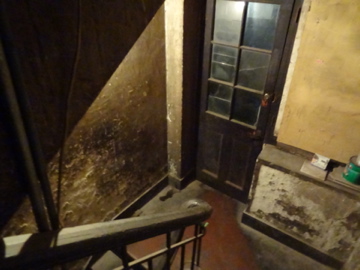 If ever you make a horror movie and do not have enough money to create the set, you can go to Wuhan and get into one of the buildings there. I took a very bright photo from the library but in reality, it was pretty much the only one which I could take a photo of. The rest of the inside was so dark that we had to walk with the dim lights of our cellphones. The twinkling televisions from some rooms made the atmosphere even creepier and spookier.
If ever you make a horror movie and do not have enough money to create the set, you can go to Wuhan and get into one of the buildings there. I took a very bright photo from the library but in reality, it was pretty much the only one which I could take a photo of. The rest of the inside was so dark that we had to walk with the dim lights of our cellphones. The twinkling televisions from some rooms made the atmosphere even creepier and spookier.
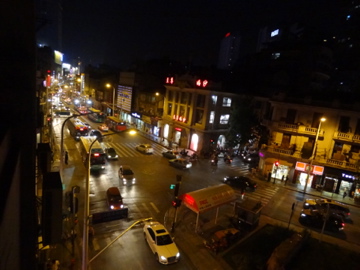 From the top of the roof I took some photos. In China, you can see sometimes that the entrance is so beautiful but the interior is completely different. This was a typical case, since this street is colorful and full of lights, but the building we entered was so dark and dirty. Maybe it is going to be entirely different a few years from now. In this sense, it was very nice that I could be a witness of the future of what it looked like once in China.
From the top of the roof I took some photos. In China, you can see sometimes that the entrance is so beautiful but the interior is completely different. This was a typical case, since this street is colorful and full of lights, but the building we entered was so dark and dirty. Maybe it is going to be entirely different a few years from now. In this sense, it was very nice that I could be a witness of the future of what it looked like once in China.
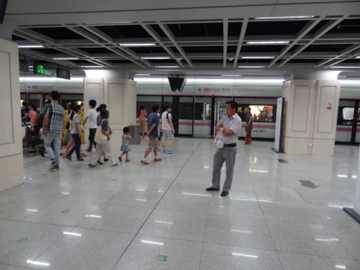 I went back home by metro and by bus. The metro has been constructed just a few years ago. It was still clean and there were TV screens inside which showed security systems people need to know how to use (which I found was ingenious since there are so many security measures in subway in general but I had never known how they work or what I need to do in emergency. Probably this knowledge is useful everywhere around the world). But the train wobbled quite a lot. Not particularly difficult to stay standing but after having seen the Korean subway train in Almaty I am probably pickier than before :)
I went back home by metro and by bus. The metro has been constructed just a few years ago. It was still clean and there were TV screens inside which showed security systems people need to know how to use (which I found was ingenious since there are so many security measures in subway in general but I had never known how they work or what I need to do in emergency. Probably this knowledge is useful everywhere around the world). But the train wobbled quite a lot. Not particularly difficult to stay standing but after having seen the Korean subway train in Almaty I am probably pickier than before :)
Wei was waiting for me at home. I know that the people get up very early in the morning in China so I feel now a little bit sorry for coming back home late in the evening but he did not seem to be bothered.
You cannot believe the number of mosquitos in this region. In the room I was staying in, there were at least five mosquitos, even though I did not open the window. I don't know how they managed to get inside but considering that there are much more of them outside, it was not a big surprise. If you go to Wuhan in summer, get prepared. It's worse than in Europe or Japan.
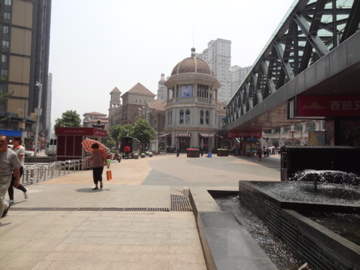 Wei had to work the whole day on the following day. I contacted another couch surfer, island7 (I don't know what was his real name) and we walked around the city. There are not many historical buildings in Wuhan but many new buildings like the ones on the photo. They represent a Spanish style city. I don't know if it truely looks like a Spanish city (I have never been there) but it was somewhat funny that he wanted to show me this part of the city, since the European style is not anything very new to me. To be honest, I had almost skipped all the European countries in this trip because I was not particularly interested in them (and I can also visit them later in my life).
Wei had to work the whole day on the following day. I contacted another couch surfer, island7 (I don't know what was his real name) and we walked around the city. There are not many historical buildings in Wuhan but many new buildings like the ones on the photo. They represent a Spanish style city. I don't know if it truely looks like a Spanish city (I have never been there) but it was somewhat funny that he wanted to show me this part of the city, since the European style is not anything very new to me. To be honest, I had almost skipped all the European countries in this trip because I was not particularly interested in them (and I can also visit them later in my life).
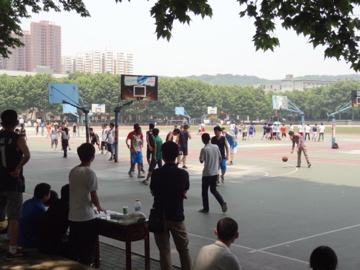 Then we went to his university campus, which was just nearby. Young people in this country heavily play basket ball. It's not clear from this photo but you can maybe see that the soccer field behind the basketball fields is almost empty. Maybe we can see more Chinese basketball players in the future :)
Then we went to his university campus, which was just nearby. Young people in this country heavily play basket ball. It's not clear from this photo but you can maybe see that the soccer field behind the basketball fields is almost empty. Maybe we can see more Chinese basketball players in the future :)
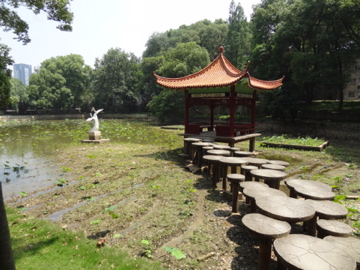 The campus had a lot of green. In this pavillon we talked a lot about different lives in China and Europe. He is one of those who want to go to the USA to work. He told me that in order to do this, the easiest way is to go to Sweden first to get the nationality, which will take 13 years (?) and then further to the USA. 13 years is not a quantity that I would be able to foresee but since there is no other way for him, maybe people in China still do it. Of course he will need a visa to go to Sweden and it's not very easy for him. In this summer, he will visit Europe for the first time and as a Chinese citizen he needed the flight ticket, the reservations of all the hotels, a list of objects he was planning to visit and his bank account information. He waited for the visa for one month and in the end he got it. Well, it's really not so easy, to be true...
The campus had a lot of green. In this pavillon we talked a lot about different lives in China and Europe. He is one of those who want to go to the USA to work. He told me that in order to do this, the easiest way is to go to Sweden first to get the nationality, which will take 13 years (?) and then further to the USA. 13 years is not a quantity that I would be able to foresee but since there is no other way for him, maybe people in China still do it. Of course he will need a visa to go to Sweden and it's not very easy for him. In this summer, he will visit Europe for the first time and as a Chinese citizen he needed the flight ticket, the reservations of all the hotels, a list of objects he was planning to visit and his bank account information. He waited for the visa for one month and in the end he got it. Well, it's really not so easy, to be true...
Simultaneously it is not that easy to go to China either. I personally had to fly to Hong Kong to get a visa for three months, which probably would have been impossible otherwise. But I was one of lucky people since Guillaume and Félix, who come from France and Spain, respectively, had to pay a lot of money in Bishkek and wait for a long time to get a visa for merely one month. I don't know what people can do within one month in China. It's such a vast country.
There is nothing I can add but for sure this misfortune I learned in this trip will be one of its legacies.
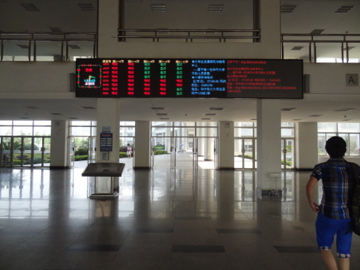 We then visited what he called a work hall. It was his first year at the university but he had just finished his exam session this week or last week. There were still many exams going on. In contrast to Japanese students, Chinese students apparently work very hard in the university, even though the entrance exam is also very hard, they say. But fortunately there are not many students who give up the study, which is a clear difference to the situation in Germany.
We then visited what he called a work hall. It was his first year at the university but he had just finished his exam session this week or last week. There were still many exams going on. In contrast to Japanese students, Chinese students apparently work very hard in the university, even though the entrance exam is also very hard, they say. But fortunately there are not many students who give up the study, which is a clear difference to the situation in Germany.
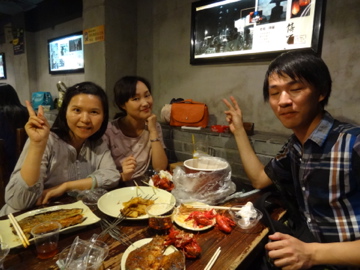 In the evening, there was another couch surfer, Shyoki (left on the photo) who was working in Wuhan in international trade. And we had dinner together, with one of her coworkers (center). Can you see the lobsters on the table? Ha! Finally I could eat them (though "finally" was not the striking emotion because I had seen them for the first time on the previous day). Shyoki chose this job because she also likes traveling. She had just come back from a business tour in Europe. We could talk about Paris, Germany etc. It's such a lucrative job but she's now planning to open a café somewhere in Wuhan. Nice dream :)
In the evening, there was another couch surfer, Shyoki (left on the photo) who was working in Wuhan in international trade. And we had dinner together, with one of her coworkers (center). Can you see the lobsters on the table? Ha! Finally I could eat them (though "finally" was not the striking emotion because I had seen them for the first time on the previous day). Shyoki chose this job because she also likes traveling. She had just come back from a business tour in Europe. We could talk about Paris, Germany etc. It's such a lucrative job but she's now planning to open a café somewhere in Wuhan. Nice dream :)
She was a great fan of the Japanese culture. She asked me a lot of things but unfortunately I knew almost nothing... It's a shame that foreigners know much more about Japan than I do.
I don't know how we came to this topic but we talked about gays. All of them thought I was a gay but regardless of what I am, it's not very good to be a gay in China, apparently. I personally like gays (probably this comment made them think that I'm a gay...) because they usually have very good personalties, though I'm not very sure if this feature is directly related to be a gay. But I also met people who do not share the same space with gays in China, though they could not explain exactly why. Lesbians, on the other hand, are okay. This is pretty much everywhere the same, even in Nazi Germany.
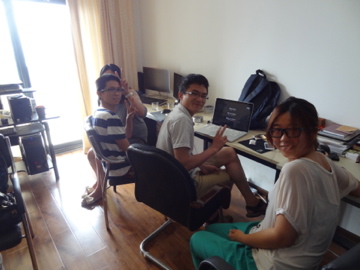 Following day, Wei had finally time so we went out together. He took me to his studio. The coworkers there were so impressed from my trip that we did a spontaneous interview there. The record will stay there for the moment. I don't know how they would be able to use it but I could enjoy the conversation with them. Meanwhile this trip is nothing special anymore to me so it's very hard to estimate what the people are really interested in. I mean, you will probably be confused if there's someone who is interested in your daily life, won't you? This is now exactly the problem I have. Of course I find the local cultures extremely interesting but this is not something that they are usually looking forward to. Hm, maybe I should think of that deeply...
Following day, Wei had finally time so we went out together. He took me to his studio. The coworkers there were so impressed from my trip that we did a spontaneous interview there. The record will stay there for the moment. I don't know how they would be able to use it but I could enjoy the conversation with them. Meanwhile this trip is nothing special anymore to me so it's very hard to estimate what the people are really interested in. I mean, you will probably be confused if there's someone who is interested in your daily life, won't you? This is now exactly the problem I have. Of course I find the local cultures extremely interesting but this is not something that they are usually looking forward to. Hm, maybe I should think of that deeply...
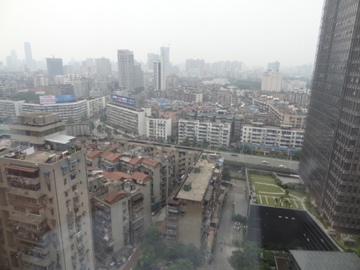 This was the view from the studio. I don't know whether it was due to the air pollution of it was just cloudy. Anyway since Lanzhou or so I have never had a completely blue sky, as you might have noticed on the photos I put.
This was the view from the studio. I don't know whether it was due to the air pollution of it was just cloudy. Anyway since Lanzhou or so I have never had a completely blue sky, as you might have noticed on the photos I put.
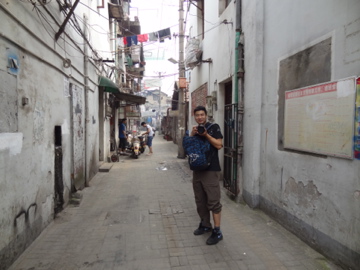 After the office Wei showed me the old part of the city. There is nothing like "old district" but old buildings are kind of everywhere in the city. Anyway, it's impossible to see similar old buildings in Europe. You can find some of them still in Japan and I find them extremely interesting. Well, when I get back to Tokyo I can do a lot of explorations with my friends from Germany :)
After the office Wei showed me the old part of the city. There is nothing like "old district" but old buildings are kind of everywhere in the city. Anyway, it's impossible to see similar old buildings in Europe. You can find some of them still in Japan and I find them extremely interesting. Well, when I get back to Tokyo I can do a lot of explorations with my friends from Germany :)
So, this was supposed to be the last day in Wuhan but it was supposed to be stormy the following day according to the weather forecast. As nice as other Chinese couch surfers were, Wei told me there wouldn't be any problem that I stay one more day. The most frustrating thing was, it did not rain... And being too afraid of being struck by the storm, I stayed at home the whole day. Probably the mother of Wei was wondering what I was doing on such a huge trip, being home alone at someone's place...
I really really wanted to cycle again the following day, which I had to drop off in the end, as it did not stop raining. I could not get out of the house either, because there was nobody anymore at home when I wanted to do it so. What a sad day...
Wuhan-Hefei-Nanjing
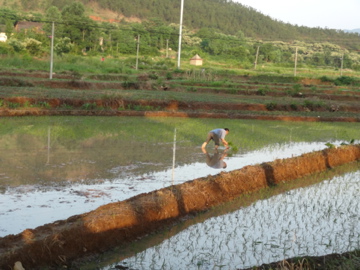 There is not much to tell on the way between Wuhan and Hefei. There were tons of villages with unclear borders in between. You can be sure that you can always get supplies on the way. One big drawback on the other hand, is that there is almost no restaurant in those villages, which was a big surprise for me, while it's not difficult to understand, as there is no reason for these villagers to go to a local restaurant. After all, every single Chinese knows how to cook, especially in villages.
There is not much to tell on the way between Wuhan and Hefei. There were tons of villages with unclear borders in between. You can be sure that you can always get supplies on the way. One big drawback on the other hand, is that there is almost no restaurant in those villages, which was a big surprise for me, while it's not difficult to understand, as there is no reason for these villagers to go to a local restaurant. After all, every single Chinese knows how to cook, especially in villages.
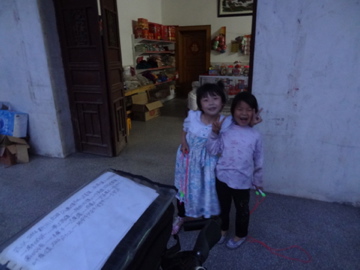 The weather strongly reminded me of Japan. It was incredibly hot and humid. Of course the people almost look like Japanese. One big difference was that these villages have completely different lives than the metropolitan cities, such as Xi'an or Wuhan. Namely there is sometimes even no light in the houses. And as you can see on the photo, the people usually do not have a machinery for the agriculture. The situation that there is no foreigner outside of big cities did not change, inspite of my anticipation. Obviously there is little difference in this sense between east and west in China. The differences in development can solely seen in big cities.
The weather strongly reminded me of Japan. It was incredibly hot and humid. Of course the people almost look like Japanese. One big difference was that these villages have completely different lives than the metropolitan cities, such as Xi'an or Wuhan. Namely there is sometimes even no light in the houses. And as you can see on the photo, the people usually do not have a machinery for the agriculture. The situation that there is no foreigner outside of big cities did not change, inspite of my anticipation. Obviously there is little difference in this sense between east and west in China. The differences in development can solely seen in big cities.
As always, I could always ask people to put a tent. Just two days before my arrival, I could put it in front of a small local market, where these two girls obviously could not talk to me first while saying stuff like "Hey, where is that guy coming from!?" "I don't know!!!" in a way that I could clearly hear the conversation. Small children are everywhere the same. Also in the sense, that they never stopped talking to me, once when I spoke to them :-)
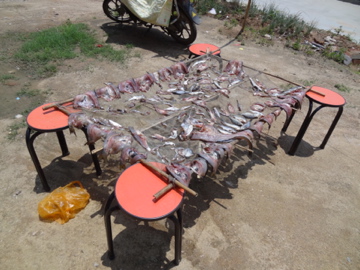 The distance was a little bit more than 450km. It was of course not difficult to do it in three days. I had two times or three times a day a flat tyre, which made the situation of course much more complicated, but fortunately now I'm so used to it that I can fix it in 10 minutes. Maybe I should start to look for German tyres which I found out were much more reliable than the ones from Taiwan that I bought in Hong Kong...
The distance was a little bit more than 450km. It was of course not difficult to do it in three days. I had two times or three times a day a flat tyre, which made the situation of course much more complicated, but fortunately now I'm so used to it that I can fix it in 10 minutes. Maybe I should start to look for German tyres which I found out were much more reliable than the ones from Taiwan that I bought in Hong Kong...
On the way to Hefei, there was one student from Hefei, Weihao, who picked me up. Actually he is now just 19 years old but he's been dreaming of traveling around the world by bicycle, just as I've been doing for quite a while now. At the same time, it was the first time for him to use the website of couch surfing, which is the case for a lot of people in Hefei since it's not on the Silk Road anymore and it's not a touristic city at all. It is very interesting to talk to people here in China, who do not have so much experience in talking with foreigners, which I could feel strongly from Weihao's shy attitude. But at least he did talk to me. Nice courageous guy.
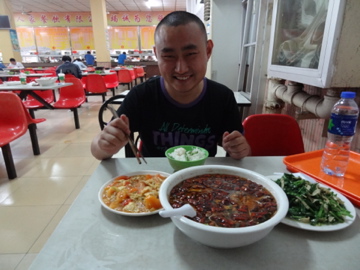 Hefei is the capital and the largest city of Anhui province but interestingly, it was very easy to cycle through the city, as the routes for cyclists are physically better separated than in other cities, which is essential in China as otherwise the people do not care about lines or zones etc. We went to the place of my host, Peter, who was a teacher in English in a prominent institute (which I don't remember the name of anymore). He is himself a cyclist and dreaming of traveling around the world himself, too. Of course I had many things to tell there over the sumptuous dinner in the students' cantine. It's so nice that the cantines are open for dinner as well in China, whereas I would love to have a kitchen in the dormitory, too.
Hefei is the capital and the largest city of Anhui province but interestingly, it was very easy to cycle through the city, as the routes for cyclists are physically better separated than in other cities, which is essential in China as otherwise the people do not care about lines or zones etc. We went to the place of my host, Peter, who was a teacher in English in a prominent institute (which I don't remember the name of anymore). He is himself a cyclist and dreaming of traveling around the world himself, too. Of course I had many things to tell there over the sumptuous dinner in the students' cantine. It's so nice that the cantines are open for dinner as well in China, whereas I would love to have a kitchen in the dormitory, too.
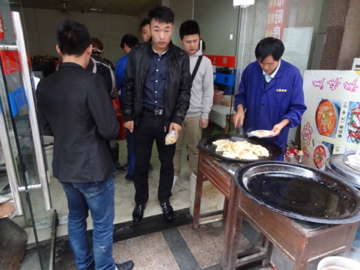 I had a day off following day. After the breakfast which we had for whatever reason in this internet café, I had to finish my CV to apply for a position at the university I used to work for in my master. I don't know exactly whether it was just a formality or a real competition going on, as my boss sounded like I don't need to worry about it anymore when I was leaving France last year. In any case it took me a lot of time to write the motivation letter after not having used written French for quite a while.
I had a day off following day. After the breakfast which we had for whatever reason in this internet café, I had to finish my CV to apply for a position at the university I used to work for in my master. I don't know exactly whether it was just a formality or a real competition going on, as my boss sounded like I don't need to worry about it anymore when I was leaving France last year. In any case it took me a lot of time to write the motivation letter after not having used written French for quite a while.
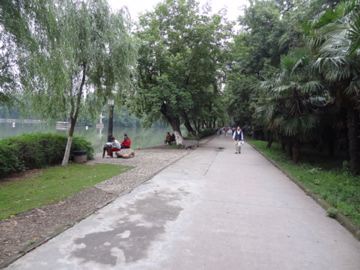 In the afternoon, we went to a big park nearby. There was a "historical" site which required entrance fee so we skipped it. The park itself was for free, as in many places in China.
In the afternoon, we went to a big park nearby. There was a "historical" site which required entrance fee so we skipped it. The park itself was for free, as in many places in China.
So, another social issue going on. This time, he is in a slightly different position than other guys I have met so far in China. Peter is not a student anymore. The problem that comes is that you need a house to get married in China, as in Iran, which I don't think is easy if the parents do not help you financially. Thanks to (?) the one child policy, the parents quite often support them but what would happen in MY particular case for example? The same problem is occurring for Peter, namely, he does not want to stay in one place forever. Peter finds it silly to get married at the moment but it'll certainly come in the future as it is so important in the Chinese society.
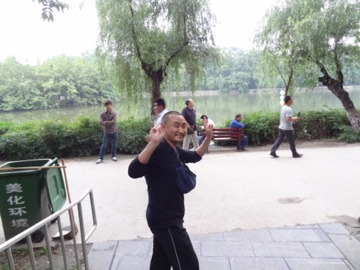 The by-product of this problem is the counter force creating a wave of preference of girls in China for whom there is no significant restriction. In my generation, there are clearly more boys than girls, making the situation even worse but it might change in some years. There is otherwise anyway no discrimination against women in China so there is almost no reason to prefer boys here. In any case, I would wish to be able to have a boy or a girl without considering social circumstances in the end. What do you think?
The by-product of this problem is the counter force creating a wave of preference of girls in China for whom there is no significant restriction. In my generation, there are clearly more boys than girls, making the situation even worse but it might change in some years. There is otherwise anyway no discrimination against women in China so there is almost no reason to prefer boys here. In any case, I would wish to be able to have a boy or a girl without considering social circumstances in the end. What do you think?
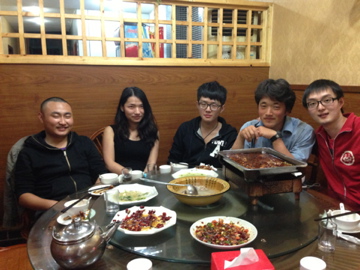 There were somehow so many people who contacted me in Hefei whereas I could stay only two days. So we decided to meet up in a restaurant. The first guy from right, Yevi, was a Ph.D student at the local university, though he tried to go abroad for this, which eventually did not work. We often have the impression in foreign countries, such as Germany and France, that so many Chinese students are going abroad, but in reality it is quite difficult for them to go there. The problem is also, those who come to Europe are of very wealthy families and usually it's not the students themselves, but the parents want them to go there, which often lead to lack of communication with locals (=Europeans), destroying the reputation of Chinese students themselves. It's really a shame that someone like Yevi cannot go abroad.
There were somehow so many people who contacted me in Hefei whereas I could stay only two days. So we decided to meet up in a restaurant. The first guy from right, Yevi, was a Ph.D student at the local university, though he tried to go abroad for this, which eventually did not work. We often have the impression in foreign countries, such as Germany and France, that so many Chinese students are going abroad, but in reality it is quite difficult for them to go there. The problem is also, those who come to Europe are of very wealthy families and usually it's not the students themselves, but the parents want them to go there, which often lead to lack of communication with locals (=Europeans), destroying the reputation of Chinese students themselves. It's really a shame that someone like Yevi cannot go abroad.
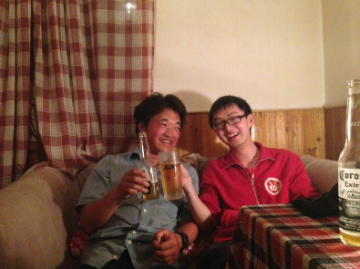 There is no couch surfer meeting in Hefei. It was the first time for all of them to see other locals there. Nice that "I" connected the people :) When I was living in Japan several years ago, I found it pretty difficult to talk to total strangers (even though there's a semi-traditional culture of Gôkon or Konpa) but here in China there's less concern about this.
There is no couch surfer meeting in Hefei. It was the first time for all of them to see other locals there. Nice that "I" connected the people :) When I was living in Japan several years ago, I found it pretty difficult to talk to total strangers (even though there's a semi-traditional culture of Gôkon or Konpa) but here in China there's less concern about this.
Later in the evening we went to a bar run by a French. I don't know how much beer we drank. It was quite an amount. And unfortunately I cannot tell which bar it was but apparently the local expats all go to this bar since I could see a lot of foreigners there.
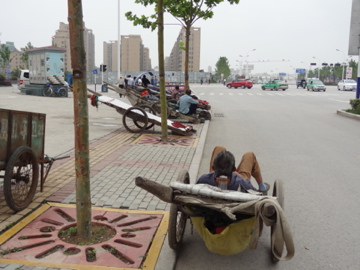 Probably I have used my tent more than just several times. Now, one of the bones is broken and I really did not want to negotiate with the dodgy hotels here where most of them refuse foreigners. In the end, I decided to go to Nanjing in one day, with the total distance more than 210km. I got up at 4:20am in spite of the booze session of the previous night and started the journey just after 5am.
Probably I have used my tent more than just several times. Now, one of the bones is broken and I really did not want to negotiate with the dodgy hotels here where most of them refuse foreigners. In the end, I decided to go to Nanjing in one day, with the total distance more than 210km. I got up at 4:20am in spite of the booze session of the previous night and started the journey just after 5am.
The national road 312 became suddenly a highway so I needed to take several different routes, of which there was no national road. The thing is just if it's not a national road, the condition of the road might be so much worse, which was exactly the case on this day.
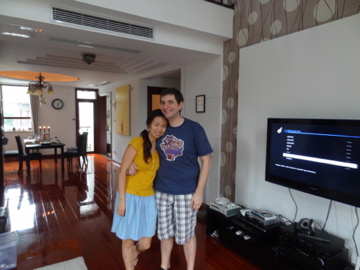 At 9pm, I was behind the famous Yantze river, without knowing how to cross it. There are three bridges in total but as always in China, it is totally unclear how to behave as cyclist/pedestrian since most of the streets are constructed for cars. In the end, I found out that I had to take the furthest bridge available. You cannot believe what a huge river it is. And the bridge is also incredibly high, which in total makes you feel as if you were looking down on an ocean from the sky, with small boats floating on the river.
At 9pm, I was behind the famous Yantze river, without knowing how to cross it. There are three bridges in total but as always in China, it is totally unclear how to behave as cyclist/pedestrian since most of the streets are constructed for cars. In the end, I found out that I had to take the furthest bridge available. You cannot believe what a huge river it is. And the bridge is also incredibly high, which in total makes you feel as if you were looking down on an ocean from the sky, with small boats floating on the river.
I arrived at my host's place just before 11pm. As you can see on the photo, they were a young couple with Yanan and Boris from Beijing and Paderborn (Germany), respectively. Not only Boris, but also Yanan spoke excellent German so we did not have a problem with the communication. We had a glass of beer together
This was the last day in May. This month flew away like a lightning, probably because I had much less concern in general there. Simultaneously, there were a lot of positive discoveries in the country which I was afraid of to a certain extent, before I arrived here. Political problems make me crazy but at least in this trip, I can simply behave as I want. What a fortune that I visited this country.
Next month, I'll go to Korea and maybe I also arrive in Japan. In this sense, it is the last month of this trip discovering new things in new places. I don't speculate too much what happens after that because I'm sure that I'm going to miss a lot of things anyway. But the most important thing to do now is to concentrate on what I can do in the remaining one month and a half to complete this trip with a great end :-)
 Usually I don't take so much time before I start cycling in the morning. This morning was an exception, since there was Gaorun and I had the opportunity to know what a typical Chinese breakfast looks like. An interesting fact (esp. for Europeans) is that they almost never eat anything sweet in the morning. Sweet things? It will probably make Chinese crazy if you give them something sweet in the morning. The country of strong Kung-fu fighters starts the day with a dish of full meat dumplings with chili sauce.
Usually I don't take so much time before I start cycling in the morning. This morning was an exception, since there was Gaorun and I had the opportunity to know what a typical Chinese breakfast looks like. An interesting fact (esp. for Europeans) is that they almost never eat anything sweet in the morning. Sweet things? It will probably make Chinese crazy if you give them something sweet in the morning. The country of strong Kung-fu fighters starts the day with a dish of full meat dumplings with chili sauce.
 So, the first day of May started like this. What's more, there was a monster waiting for me: 3000m pass. In the city of Gulang it was already at 2000m above sea level so the difference was merely 1000m but you know, it's not so easy to cycle at this height, with full luggage. It took half a day to go up to the top. It also started to rain near the top of the mountain.
So, the first day of May started like this. What's more, there was a monster waiting for me: 3000m pass. In the city of Gulang it was already at 2000m above sea level so the difference was merely 1000m but you know, it's not so easy to cycle at this height, with full luggage. It took half a day to go up to the top. It also started to rain near the top of the mountain.
 In the end, half past 1, we made it. 3000m. The rest of the day was just to go down the hill. The other side of the pass was even more green and especially, wet. The fact that it appeared to me very cold was assumingly due to lack of movements and the height. It was amazingly only going down. This is a very nice thing in mountains in China (since the side I had to climb up was pretty much the same)
In the end, half past 1, we made it. 3000m. The rest of the day was just to go down the hill. The other side of the pass was even more green and especially, wet. The fact that it appeared to me very cold was assumingly due to lack of movements and the height. It was amazingly only going down. This is a very nice thing in mountains in China (since the side I had to climb up was pretty much the same)
 I had seen tons of mosques in Central Asia and Iran and in every country I had the feeling that they look almost the same, however, in different countries they are a little bit different. So the mosques in China look not the same as the ones in Iran. This one has a quite nice Chinese entrance gate. A mixture of Middle East and China.
I had seen tons of mosques in Central Asia and Iran and in every country I had the feeling that they look almost the same, however, in different countries they are a little bit different. So the mosques in China look not the same as the ones in Iran. This one has a quite nice Chinese entrance gate. A mixture of Middle East and China.
 Originally we were planning to stay in a small city for this day which was about 100km away from Lanzhou. However, we arrived there at 4pm. There was just a problem for me that my host of the day, Tracy, lived in the east of Lanzhou, which would make 150km from the place where we were in that moment. So it was impossible to arrive there for me. Gaorun on the other hand, decided to cycle as much as he would be able to and he'd hitch hike to the city in the end. So we decided to start to cycle separately.
Originally we were planning to stay in a small city for this day which was about 100km away from Lanzhou. However, we arrived there at 4pm. There was just a problem for me that my host of the day, Tracy, lived in the east of Lanzhou, which would make 150km from the place where we were in that moment. So it was impossible to arrive there for me. Gaorun on the other hand, decided to cycle as much as he would be able to and he'd hitch hike to the city in the end. So we decided to start to cycle separately.
 Lanzhou is a city which is confined between two mountains, lying directly at the Yellow River. And therefore, the city is extremely elongated, making it quite strenuous to go from one end to the other.
Lanzhou is a city which is confined between two mountains, lying directly at the Yellow River. And therefore, the city is extremely elongated, making it quite strenuous to go from one end to the other.
 At around 4pm, I arrived in the city part of Tracy. Actually it was the first time for him to host somebody. There are also a lot of Americans from the Peace Corps in Lanzhou and I know that they are quite active in couch surfing so probably he did not need to host anybody before. I was there in the first week of May and all the Peace Corps volunteers were having a week-vacation so there was no one else there. Tracy had a vacation for a week as well but for some reason he was staying in Lanzhou. Peace Corps is a nice thing. I wish there was something similar in Japan...
At around 4pm, I arrived in the city part of Tracy. Actually it was the first time for him to host somebody. There are also a lot of Americans from the Peace Corps in Lanzhou and I know that they are quite active in couch surfing so probably he did not need to host anybody before. I was there in the first week of May and all the Peace Corps volunteers were having a week-vacation so there was no one else there. Tracy had a vacation for a week as well but for some reason he was staying in Lanzhou. Peace Corps is a nice thing. I wish there was something similar in Japan...
 It was actually students' dormitory. Each room had 8 beds and in Tracy's room there were already 7 persons (unbelievable...) so I stayed in a different room in which fortunately there were two other guys. They were all excited to have a foreign guest. Nice guys.
It was actually students' dormitory. Each room had 8 beds and in Tracy's room there were already 7 persons (unbelievable...) so I stayed in a different room in which fortunately there were two other guys. They were all excited to have a foreign guest. Nice guys.
 Following day, we visited Lanzhou. We started off with the Yellow River side. It was almost as well equipped as in Lyon, where the river side of Rhône is incredibly beautiful. As in Lyon though, there was pretty much nothing historical there. The only one thing which apparently survived was the water mill you can see on the photo.
Following day, we visited Lanzhou. We started off with the Yellow River side. It was almost as well equipped as in Lyon, where the river side of Rhône is incredibly beautiful. As in Lyon though, there was pretty much nothing historical there. The only one thing which apparently survived was the water mill you can see on the photo.
 Meanwhile I'm used to the English they speak. Here, for example "Do not climb, climb over fence in order to avoid drowning, cause harm." Well, anyway in each country this kind of non sense warning is existing, though it makes look even funnier when they translate it like this :)
Meanwhile I'm used to the English they speak. Here, for example "Do not climb, climb over fence in order to avoid drowning, cause harm." Well, anyway in each country this kind of non sense warning is existing, though it makes look even funnier when they translate it like this :)
 It's a nice thing that there is a river in the city, but you must connect the both sides. In the past, I suppose they used small boats. In the beginning of the 20th century, Germans got the order to construct a big bridge, which still exists and used. Of course it had a practical reason at that time but it is more like a tourist attraction at the same time. Since it is a small bridge it's forbidden for cars to use. Germany was politically not a very good country in the 20th century but they always did a very decent and above all honest job. It's maybe the reason why they could regain the trust of the international community quickly after the war.
It's a nice thing that there is a river in the city, but you must connect the both sides. In the past, I suppose they used small boats. In the beginning of the 20th century, Germans got the order to construct a big bridge, which still exists and used. Of course it had a practical reason at that time but it is more like a tourist attraction at the same time. Since it is a small bridge it's forbidden for cars to use. Germany was politically not a very good country in the 20th century but they always did a very decent and above all honest job. It's maybe the reason why they could regain the trust of the international community quickly after the war.
 The next object we visited was the white pagoda tower. Well, there's not much to say about this building either since it is not historical either. It is just a construction which looks nice. The pagoda tower itself was the only one which exists for centuries.
The next object we visited was the white pagoda tower. Well, there's not much to say about this building either since it is not historical either. It is just a construction which looks nice. The pagoda tower itself was the only one which exists for centuries.
 On the other side of the city there was a huge temple. Of course Buddhism comes from India but it's still interesting to see something I'm familiar with in a country I had never visited.
On the other side of the city there was a huge temple. Of course Buddhism comes from India but it's still interesting to see something I'm familiar with in a country I had never visited.
 Following day, I was planning to leave Lanzhou, in order not to put Tracy in trouble, since it was a students' dormitory. However, there was some stuff to buy for my bicycle. There was a bicycle shop near the dormitory and we found out that it's very very rare to see a 28-inch bicycles in China. They told me I would have to go to the city center to buy it. Well, I was almost giving up, thinking it's maybe better to try it again in Xi'an. But Tracy told me that there wouldn't be any problem to stay one more day so I decided to look around in the city center. Nice guy.
Following day, I was planning to leave Lanzhou, in order not to put Tracy in trouble, since it was a students' dormitory. However, there was some stuff to buy for my bicycle. There was a bicycle shop near the dormitory and we found out that it's very very rare to see a 28-inch bicycles in China. They told me I would have to go to the city center to buy it. Well, I was almost giving up, thinking it's maybe better to try it again in Xi'an. But Tracy told me that there wouldn't be any problem to stay one more day so I decided to look around in the city center. Nice guy.
 The first coco nut I had in my life. The vendor did not know exactly where it was coming from but probably from the south of China. Pretty nice country that has everything you can imagine. :) At the same time, since summer is coming, the markets are full of vegetables and fruits. Wherever I go I can buy a piece of pineapple or apples for very low prices. It's anyway not hard to stay healthy if you eat Chinese stuff (though some restaurants are pretty dirty so you should be very cautious about hygiene...)
The first coco nut I had in my life. The vendor did not know exactly where it was coming from but probably from the south of China. Pretty nice country that has everything you can imagine. :) At the same time, since summer is coming, the markets are full of vegetables and fruits. Wherever I go I can buy a piece of pineapple or apples for very low prices. It's anyway not hard to stay healthy if you eat Chinese stuff (though some restaurants are pretty dirty so you should be very cautious about hygiene...)
 One day more was a great thing. There was one museum which seemed to be quite interesting in the city so we decided to go there together. I don't know exactly why Tracy did not need to go to the university but it's always nice to have a company :)
One day more was a great thing. There was one museum which seemed to be quite interesting in the city so we decided to go there together. I don't know exactly why Tracy did not need to go to the university but it's always nice to have a company :)
 So, the state museum. As in many museums in China, this one was also for free. There are a lot of public services for free in China, if it's for Chinese. If it's for foreigners, it's usually not the case anymore, starting with the Chinese visa (and also the visa card, which cannot be used at all in Lanzhou. Forget about that). At the same time, it is also very difficult for Chinese citizens to get visas for foreign countries so it's maybe about the chicken or the egg.
So, the state museum. As in many museums in China, this one was also for free. There are a lot of public services for free in China, if it's for Chinese. If it's for foreigners, it's usually not the case anymore, starting with the Chinese visa (and also the visa card, which cannot be used at all in Lanzhou. Forget about that). At the same time, it is also very difficult for Chinese citizens to get visas for foreign countries so it's maybe about the chicken or the egg.
 There were a lot of thing related to the Silk Road in this museum. Before I started this trip I was not so much interested in the Silk Road but after having done exactly this route, I know much more about its history and the environment. Now I'm a kind of expert and more interested in this stuff. If ever I write a book about this trip, more than 80% will be about this route I would say, with the development of local cultures.
There were a lot of thing related to the Silk Road in this museum. Before I started this trip I was not so much interested in the Silk Road but after having done exactly this route, I know much more about its history and the environment. Now I'm a kind of expert and more interested in this stuff. If ever I write a book about this trip, more than 80% will be about this route I would say, with the development of local cultures.
 After the museum, we walked around a little bit to see what's going on in the street. People love board games in China, doesn't matter young or old, men or women. I have no idea what they were playing but the audience seems to be interested :)
After the museum, we walked around a little bit to see what's going on in the street. People love board games in China, doesn't matter young or old, men or women. I have no idea what they were playing but the audience seems to be interested :)
 We visited another temple after that, the white cloud temple (?) which also belongs to a kind of Buddhism, though not exactly Buddhism, according to Tracy.
We visited another temple after that, the white cloud temple (?) which also belongs to a kind of Buddhism, though not exactly Buddhism, according to Tracy.
 We went to the same restaurant in the evening. There was a girl from his native region, Arina, who joined us there. Her major was English but obviously it was the first time for her to speak English. It was more difficult for her the previous day but there she tried much more. I mean, I'm a (pseudo-) language teacher so she didn't need to be so much worried about saying anything incomprehensible but it's a prevalent problem among Asians (though Chinese girls often talk a lot in comparison with boys)
We went to the same restaurant in the evening. There was a girl from his native region, Arina, who joined us there. Her major was English but obviously it was the first time for her to speak English. It was more difficult for her the previous day but there she tried much more. I mean, I'm a (pseudo-) language teacher so she didn't need to be so much worried about saying anything incomprehensible but it's a prevalent problem among Asians (though Chinese girls often talk a lot in comparison with boys)






































































